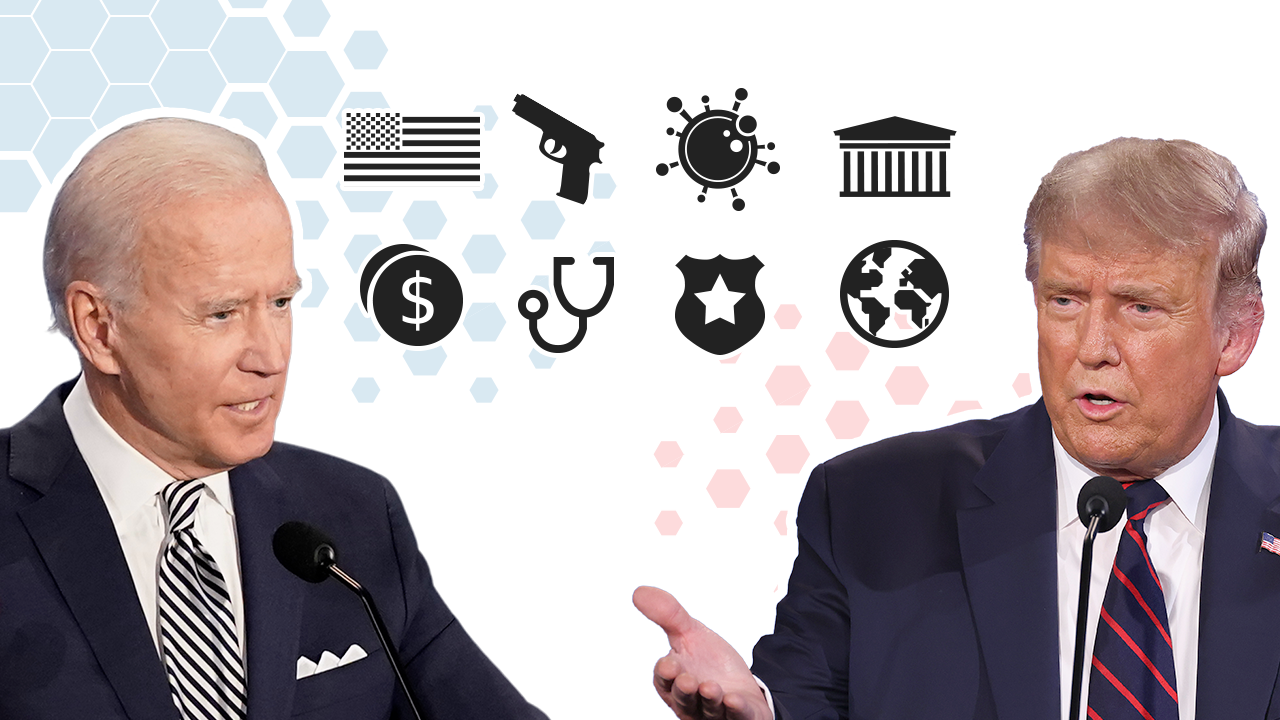US election 2020: What has Trump said about your country?
- Published

Donald Trump is a man who prefers plain speaking to the language of diplomacy.
During his four years in office, the US president has upended relationships with previously solid US allies, forged surprising new friendships and tweeted about it all - a lot.
We've taken a look at the countries he's mentioned most on Twitter to pick out his most notable statements and give an overview of where US relations stand as we approach the election on 3 November.
Interactive content: What has Trump said about your country?
Afghanistan

"We've had tremendous success in Afghanistan… but it's time, after all these years, to go and to bring our people back home… There are many countries that surround Afghanistan that can help. We're 8,000 miles away."- President Trump, during a press conference at the White House, 29 Feb 2020
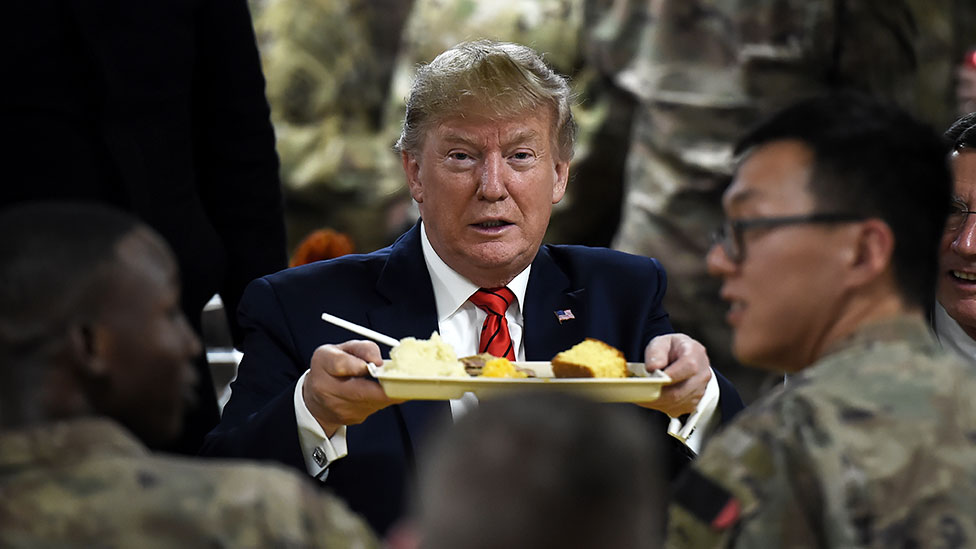
Afghanistan has been near the top of every president's in-tray since US forces invaded the country in 2001.
Before he became president, Mr Trump repeatedly described the war in Afghanistan as a "disaster" and talked about pulling US troops out of the country.
Back in 2013, he tweeted: "We have wasted an enormous amount of blood and treasure in Afghanistan. Their government has zero appreciation. Let's get out!"
But in September 2017, he agreed to send 3,000 extra troops to bolster the US contingent there as the Taliban gained ground and security deteriorated.
That same year, the US used the largest non-nuclear bomb ever deployed in combat, killing dozens of militants from the so-called Islamic State group (IS) near the border with Pakistan.
More recently though, President Trump talked of peace in the country and in February this year the US signed an agreement with the Taliban to lift sanctions on the group and oversee a prisoner swap with the Afghan government in return for a ceasefire.
Talks between the Taliban and the Afghan government remain ongoing, but President Trump is keen to push ahead with the withdrawal of US troops despite recent violence.
In early October, he tweeted that the remaining troops "should" be home by Christmas - but that wasn't endorsed by his top general.
Argentina

"Great talk with my friend President Mauricio Macri of Argentina this week. He is doing such a good job for Argentina."- @realDonaldTrump, 17 May 2018
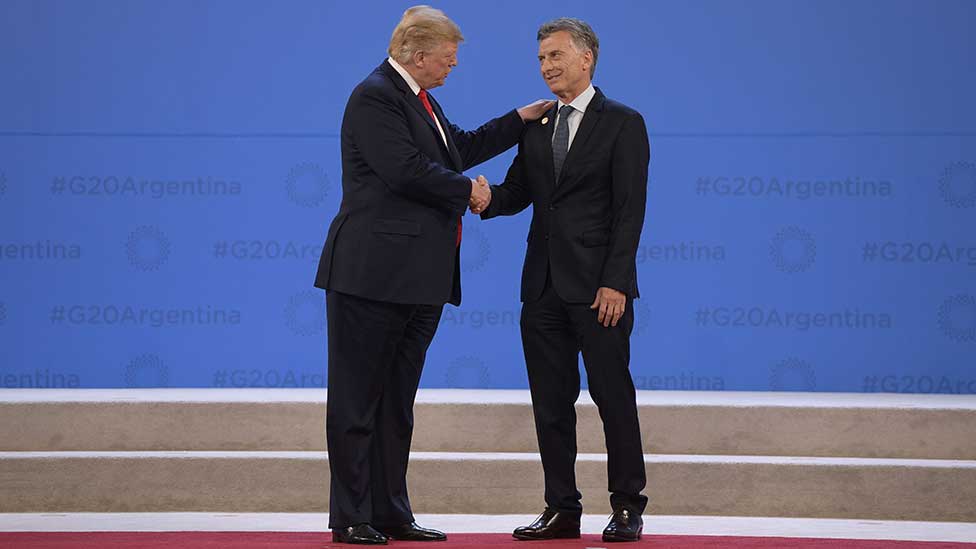
President Trump has dealt with two leaders of Argentina in his first term.
The first, Mauricio Macri, is a man whose relationship with Donald Trump dates back decades to when he and his father were doing business in 1980s New York.
That relationship came under scrutiny when Mr Macri called the US president-elect in November 2016 to congratulate him on his victory.
According to reports in Argentina, Mr Trump asked the Argentine president for help with a stalled building project by one of his companies in Buenos Aires - a claim both men denied.
Mr Trump welcomed Mr Macri to the White House in April 2017 and his only trip to Latin America as president was to take part in the G20 summit hosted by the Argentine in 2018.
But Mr Macri was defeated in 2019 by Alberto Fernández, a centre-left politician who in 2016 described Mr Trump's election win as a victory for the "worst reactionary politics".
Unsurprisingly, Mr Trump's relationship with Mr Fernández has been less positive than it was with his predecessor.
Just days before Mr Fernández entered office in December 2019, Mr Trump said he was restoring tariffs on steel and aluminium imports from Argentina - a threat that turned out to be empty but signalled a shift in the relationship.
There has been less tension between the two countries this year, mostly because both have had to focus their attention on dealing with the coronavirus pandemic.
Australia

"Congratulations to new Australian Prime Minister Scott Morrison. There are no greater friends than the United States and Australia!"- @realDonaldTrump, 25 Aug 2018
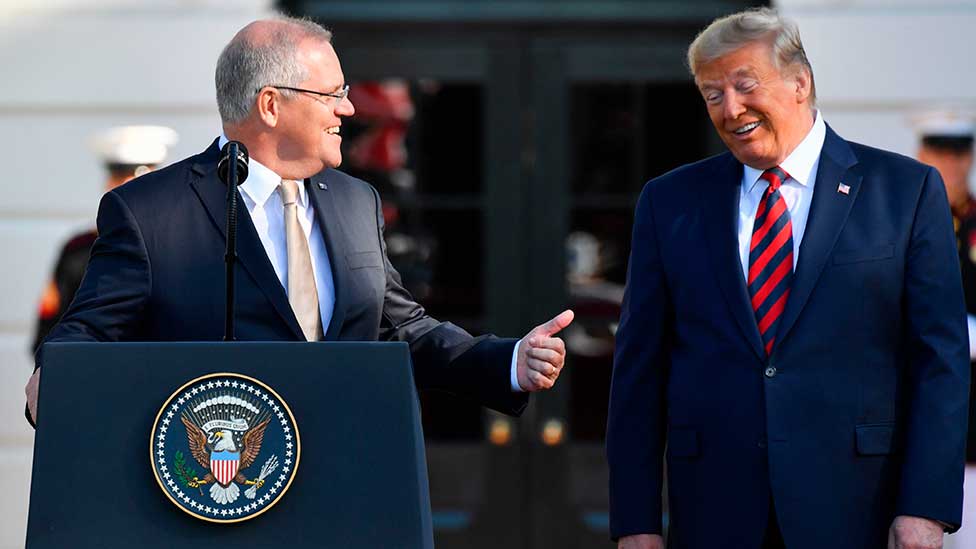
Australia has been one of America's closest allies in recent years, with its troops fighting alongside the US in Iraq and Afghanistan. But that relationship came under strain almost as soon as President Trump entered the White House.
Mr Trump was said to have had a "contentious" phone call with Prime Minister Malcolm Turnbull at the end of January 2017, reportedly over a deal agreed with President Obama that the US would take in about 1,200 refugees who had been denied entry into Australia.
A Washington Post report said the president abruptly ended the call after calling it "the worst deal ever". Mr Trump, who later publicly criticised the deal as "dumb", insisted the phone call had been "civil" while Mr Turnbull said it was a "very frank and forthright" conversation.
Later in 2017, footage leaked to the media showing Mr Turnbull poking fun at his US counterpart but officials in both countries dismissed it as harmless fun.
Still, on the face of it neither episode appeared to affect the relationship much, with President Trump saying it was "terrific" and "probably stronger now than ever before".
That continued when Scott Morrison replaced Mr Turnbull in 2018. He was given the full red-carpet treatment on a visit to the US in 2019 and was only the second person to have been given a state dinner by President Trump - the other being French President Emmanuel Macron.
The pair have lavished praise on one another, with Mr Trump a particular fan of Prime Minister Morrison's immigration policies. He tweeted about a controversial ad campaign in Australia last year, saying that "much can be learned" from the approach.
In return, Mr Morrison has praised the American president as "a strong leader who says what he's going to do and then goes and does it".
Belgium

"Do you all remember how beautiful and safe a place Brussels was. Not anymore, it is from a different world!"- @realDonaldTrump, 22 Mar 2018
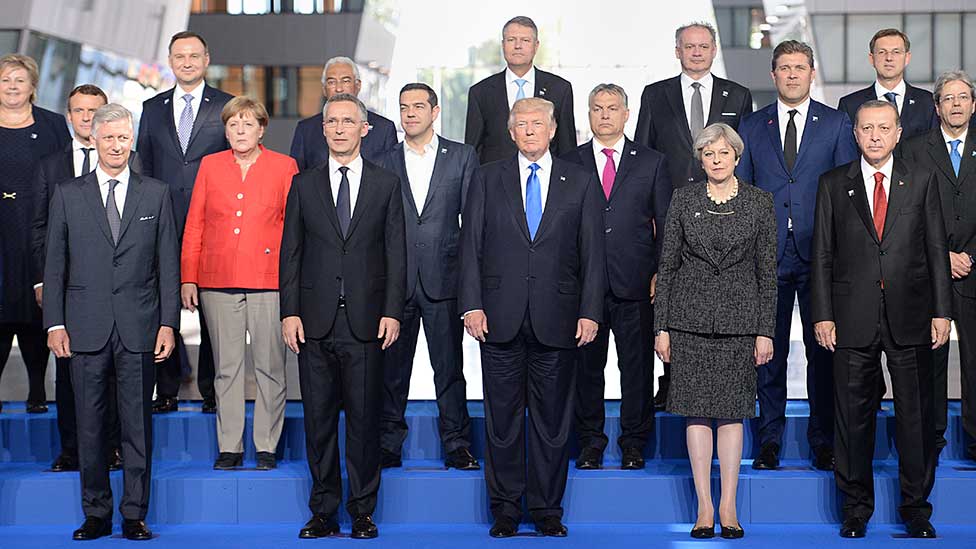
On the campaign trail in 2016, Donald Trump referred to Belgium's capital Brussels as a "hellhole" and said it was no longer beautiful or safe after being attacked by terrorists earlier that year.
Still, everything appeared to be amicable when he was welcomed to the country by King Philippe and Queen Mathilde in May 2017 before a Nato summit in the country.
Mr Trump met Prime Minister Charles Michel at the summit, praising Belgian contributions in the fight against the so-called Islamic State group and noting the "critical importance of Belgian F-16s flying missions in Iraq and Syria".
He also took the chance to remind him of "the responsibility of all nations to share our common defense burden," and to meet Nato spending commitments - a topic Mr Trump has raised again and again during his time as president.
But his most memorable moment in Belgium was when he appeared to shove Dusko Markovic, the prime minister of Montenegro, out of the way before a Nato family photo - putting his campaign slogan of "America First" firmly into action.
Brazil

"Just had a great call with the President of Brazil, @JairBolsonaro. We discussed many subjects including Trade. The relationship between the United States and Brazil has never been Stronger!"- @realdonaldtrump, 22 Mar 2018
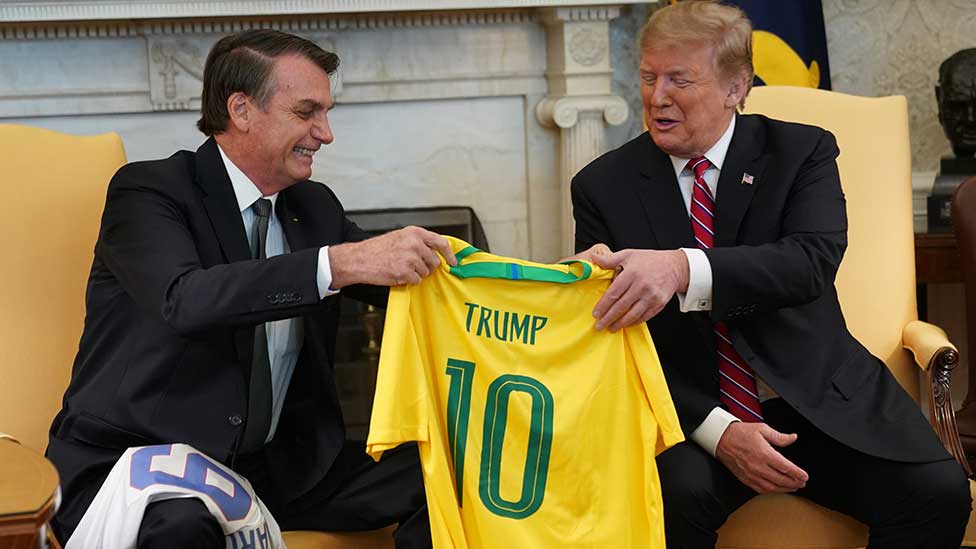
President Trump has not had much to say about Brazil, South American's most influential country - a sign, perhaps, of his more isolationist approach to foreign policy.
He had few public dealings with Michel Temer, while the latter was Brazil's president, but he's had a much more vocal relationship with Jair Bolsonaro, since he took over in January 2019.
The Brazilian's first trip overseas after becoming president was to the US, where he swapped football shirts with Mr Trump and told him: "I've always admired the USA and this sense of admiration has only increased since you took office."
That high praise wouldn't have shocked many back home in Brazil, where he was dubbed the "Trump of the Tropics" by some parts of the media in the run-up to his election victory.
President Trump has been equally lavish in his praise of Mr Bolsonaro and even said he would help Brazil join Nato - a suggestion ruled out by the head of the North Atlantic Treaty Organization. But the White House did designate Brazil as a "major non-NATO ally" in 2019, giving the country preferential access to US military equipment and training.
Also notable is that Mr Trump and Mr Bolsonaro have shared a similar view of the coronavirus pandemic with both downplaying the seriousness of the threat it posed. They are also among a handful of world leaders to have caught the virus themselves, with both recovering fully.
Botswana

"Why are we having all these people from shithole countries come here?"- President Trump's widely reported comments made in private during a meeting on immigration, 11 Jan 2018
Mr Trump's reported remark came as lawmakers from both parties visited him to propose a bipartisan immigration deal. Democratic Senator Richard Durbin had just been discussing US temporary residency permits granted to citizens of countries hit by natural disasters, war or epidemics, when Mr Trump asked, "Why are we having all these people from shithole countries come here?"
Mr Trump tweeted that he had used "tough" language but not that specific term. Senator Durbin responded by saying Mr Trump used "racist" language.
As the African Union expressed "shock, dismay and outrage" and demanded an apology, Botswana summoned the US ambassador and asked the envoy "to clarify if Botswana is regarded as a 'shithole' country given that there are Botswana nationals residing in the US."
According to the Washington Post, Mr Trump told lawmakers the US should instead be taking in migrants from countries like Norway, whose prime minister visited him a day earlier, or Asian nations.
Canada

"I love Canada, but they've taken advantage of our Country for many years!"- @realDonaldTrump, 1 Sep 2018
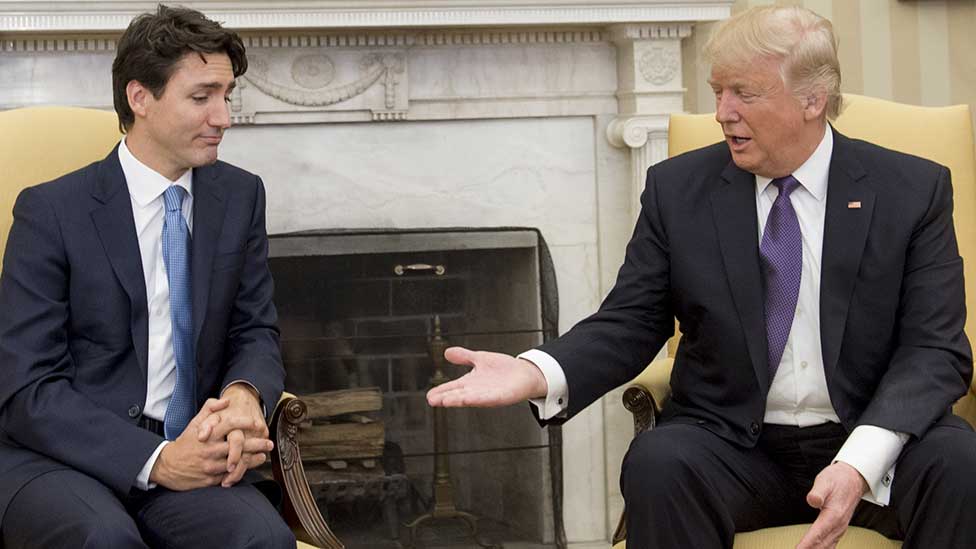
Canadian Prime Minister Justin Trudeau was among the first dozen or so world leaders to visit the White House under Donald Trump and he will have been pleased with how it went.
Not only did he deal with President Trump's fierce handshake, he also got a guarantee that the White House would only be making "tweaks" to its relationship with Canada.
But the relationship between the two leaders became strained not long after that first meeting with those tensions surfacing in public in June 2018 at a G7 summit in Quebec.
When Mr Trudeau said he would not be pushed around by the US at a post-summit press conference, Mr Trump responded by refusing to sign the joint G7 communique on trade before tweeting that the Canadian leader "acts hurt when called out".
Most of the animosity was generated by President Trump's desire to replace Nafta, the North American Free Trade Agreement signed in 1994 by the US, Mexico and Canada. He used tariffs to encourage both nations to renegotiate a deal, which was eventually agreed in October 2018.
After the announcement, Mr Trump tweeted: "Mexico, Canada and the United States are a great partnership and will be a very formidable trading force. We will now, because of the USMCA, work very well together. Great Spirit!"
Mr Trudeau, who has been in office since November 2015, has certainly had a slightly different relationship with Mr Trump to the "bromance" he had with former President Barack Obama.
Describing Mr Trump's style, the Canadian PM said in 2018: "The president prides himself on a level of disruption and unpredictability that is challenging certain aspects of global systems that we've perhaps taken for granted. And, it does keep me on my toes."
Chile

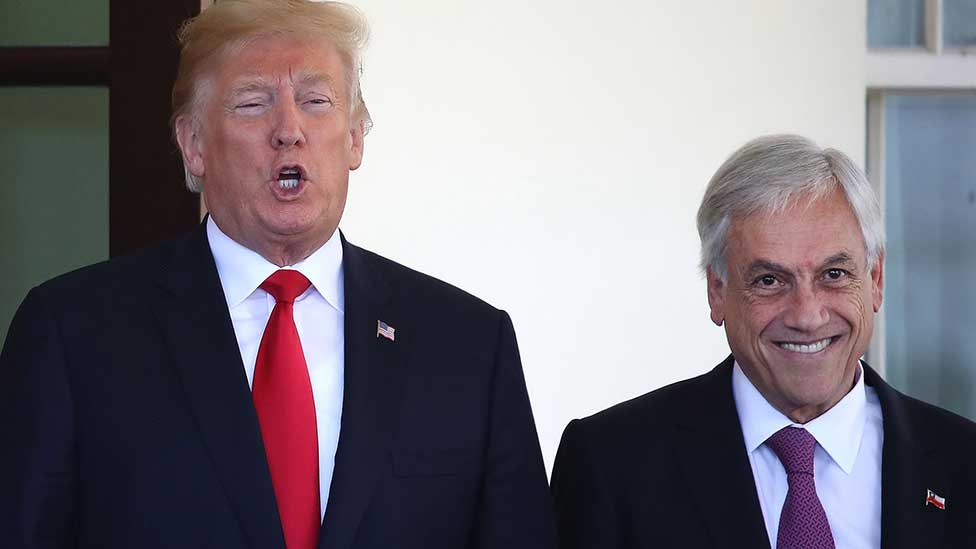
President Trump was quick to congratulate Sebastián Piñera, a conservative like himself, when he was voted into office in January 2018, saying he looked forward to working together on "issues of mutual interest".
Since then, the two billionaire presidents - Mr Piñera's estimated personal fortune is about $2.7bn (£2bn) - have had few dealings in public.
But when the country was rocked by protests over inequality in late 2019, President Trump backed his Chilean counterpart despite accusations from Amnesty International and others that the security forces were using excessive force on demonstrators.
More recently, President Piñera has tried to use his good relationship with Mr Trump to put Chile in "pole position" to get early access to a vaccine for coronavirus should the US develop one.
China

"All over the World the CoronaVirus, a very bad "gift" from China, marches on. Not good!"- @realDonaldTrump, 28 May 2020
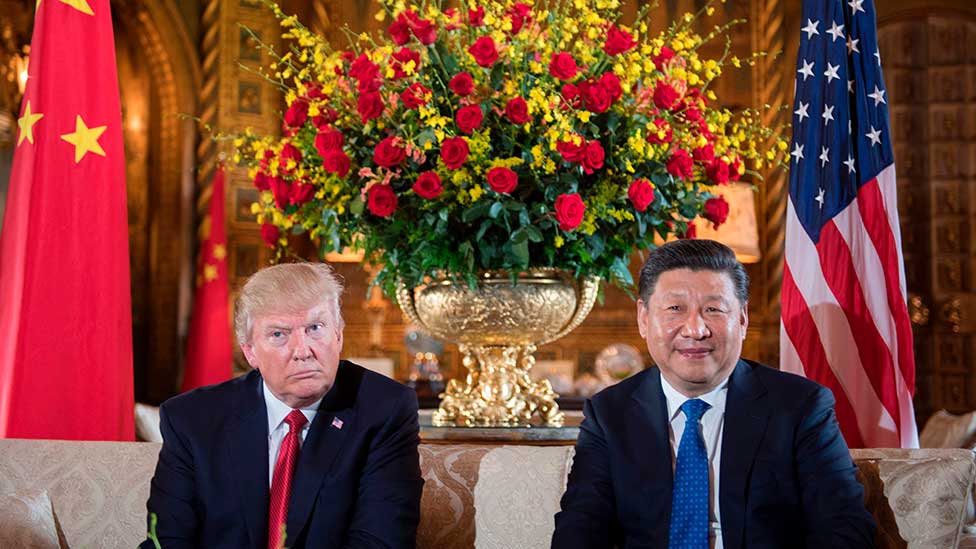
Donald Trump mentioned China so frequently on the campaign trail in 2016 that it turned into a meme. He repeatedly called the Communist state a "currency manipulator" and even accused them of "raping" the US.
After entering the White House, he antagonised Beijing again by breaking with diplomatic norms and accepting a call from the president of Taiwan, which is considered a breakaway province by China.
When China raised objections, however, President Trump spoke to Chinese President Xi Jinping on the phone and agreed to follow the so-called "One China" policy, which states that there is only one Chinese government.
After that initial tension, Mr Trump changed tack and in April 2017 hosted his Chinese counterpart at Mar-a-Lago, his retreat on the Florida coast, saying their relationship was "outstanding" and that "tremendous progress" had been made in their talks.
President Xi then welcomed Mr Trump to Beijing in November that year, with the American describing the ceremony as a "truly memorable and impressive display". At a joint press conference afterwards, Mr Trump told the Chinese president: "You are a very special man."
The two countries spent a lot of 2018 discussing a trade deal, with President Trump complaining that previous negotiations had been "so one sided in favour of China". But despite the talks, no agreement emerged and the two countries engaged in a trade war that carried over into 2019.
A "phase one" deal was eventually signed at the beginning of 2020, with Mr Trump modestly declaring it "one of the greatest trade deals ever made!" Analysts were split over how good a deal it was, but both leaders were able to present themselves as winners.
Not long after celebrating the deal, President Trump tweeted about a little known virus in China that was beginning to look concerning: "China has been working very hard to contain the Coronavirus. The United States greatly appreciates their efforts and transparency. It will all work out well. In particular, on behalf of the American People, I want to thank President Xi!"
Two months later, more than 1,000 people infected with the virus had died in the US and the number of confirmed cases was fast approaching 100,000. Mr Trump described having had a "good conversation" with President Xi and said: "We are working closely together. Much respect!"
But by the summer of 2020 though, his tone had changed. Mr Trump began referring to coronavirus as the "China virus" and tweeted: "China has caused great damage to the United States and the rest of the World!"
And as the election has neared, he's upped his anti-China rhetoric, accusing them of working to replace him with his Democratic rival Joe Biden "so they can continue to rip-off the United States".
Colombia

"We've had a great relationship with Colombia"- President Trump, speaking to reporters at the White House, 30 Aug 2019
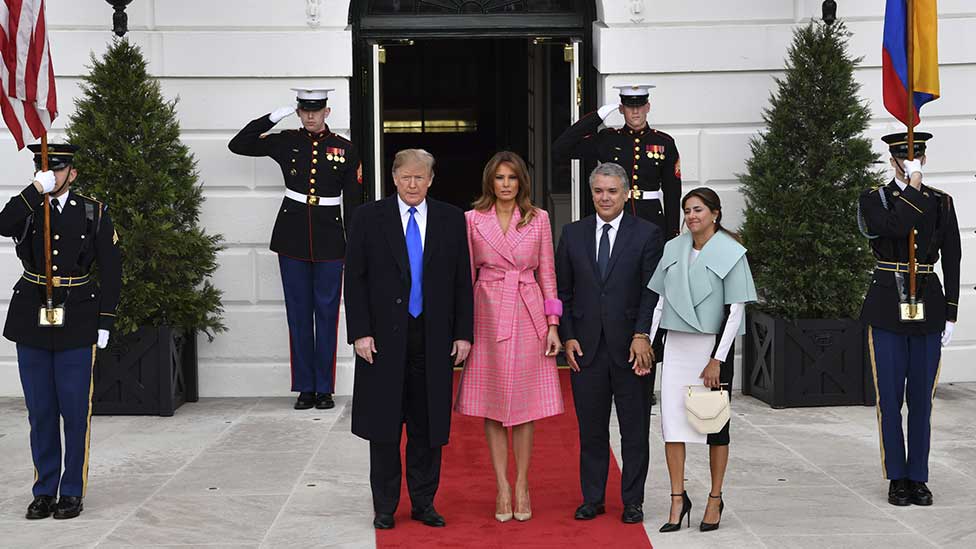
Donald Trump's relationship with the two Colombian presidents he's dealt with - first Juan Manuel Santos and then Iván Duque - has concentrated on drug cartels and Venezuela.
He has hosted both men at the White House and held talks with them on the sidelines of the United Nations General Assembly in New York.
President Duque visited the White House in February 2019, mainly to discuss the situation in Colombia's neighbour Venezuela, which has been engulfed in a political crisis for several years now.
In a joint press conference after the meeting, the US president was asked if he would be visiting Colombia, to which he replied: "I'll be visiting. I really want to. I want to visit Colombia. I look forward to visiting." He's yet to make the trip.
Later that year, President Trump said of US-Colombia ties: "We have a great relationship. They're not doing badly. They have a problem because of Venezuela a lot of people are pouring in. But Colombia, we've had a great relationship with Colombia."
Cuba

"The last administration made a pathetic one-sided deal with the Castro dictatorship that betrayed the Cuban people and enriched the communist regime."- Donald Trump, in a speech at the White House, 23 Sep 2020
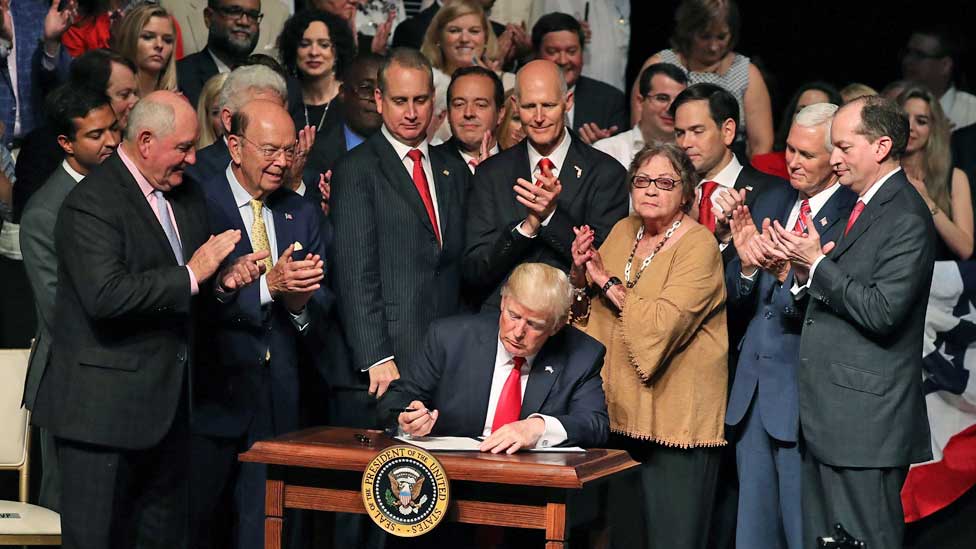
One of Donald Trump's many campaign promises was that he would roll back on President Obama's historic move in 2014 to restore full diplomatic relations with Cuba.
Once in office, Mr Trump did indeed say he was "cancelling" the deal with Cuba and he re-imposed certain travel and trade restrictions eased by his predecessor.
But the president's approach has not scrapped all of the Obama-era policy regarding the island nation.
Both countries will keep their embassies open in each other's capitals, commercial flights will continue and US tourists can still visit the country, albeit under stricter conditions.
During a speech in 2017 in Miami's Little Havana neighbourhood, where Mr Trump signed a directive outlining his policy, he lambasted President Obama's deal with the "brutal" Castro government as "terrible and misguided".
He said the US would not lift sanctions on Cuba until "all political prisoners are freed" and vowed to "help the Cuban people themselves form businesses and pursue much better lives".
Later that year, the US withdrew most staff from its embassy in Havana after several people there came down with mysterious health issues, including hearing loss, nausea and dizziness. US officials said the incident was an acoustic attack, but it remains a bit of a mystery.
As the election approaches, President Trump has sought to win over the large population of Cuban-Americans in the swing state of Florida by tightening the sanctions on the country.
Talking at a ceremony in September honoring veterans of the failed Bay of Pigs operation in 1961, Mr Trump described his predecessors' policy as "weak" and "pathetic" and boasted: "I canceled the Obama-Biden sellout to the Castro regime."
Denmark

"Denmark is a very special country with incredible people, but based on Prime Minister Mette Frederiksen's comments, that she would have no interest in discussing the purchase of Greenland, I will be postponing our meeting."- @realDonaldTrump, 21 Aug 2019
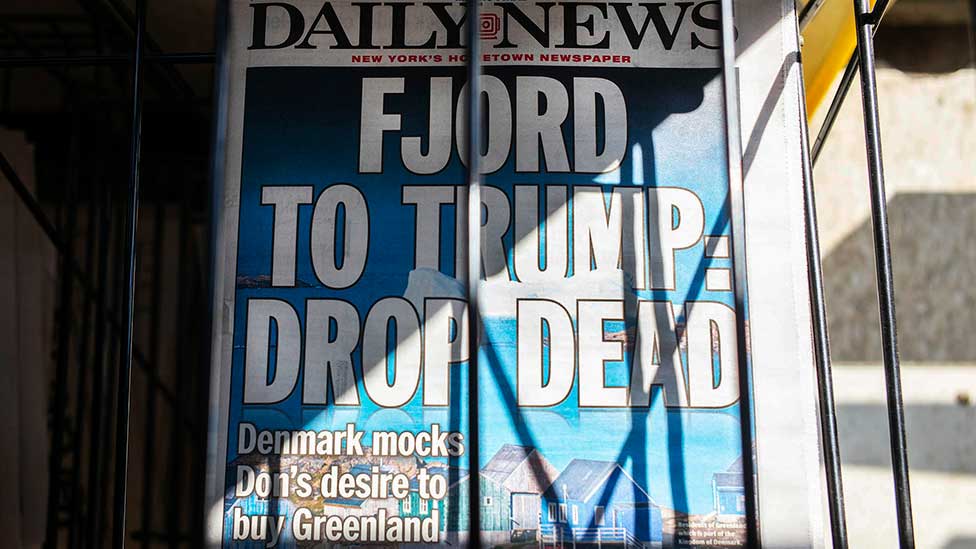
President Trump has had a bumpy relationship with Denmark's leaders.
Danish Prime Minister Lars Lokke Rasmussen was one of the first world leaders to meet Donald Trump at the White House.
Their talks at the end of March 2017 focused on the future of the Nato alliance and President Trump "urged" the Danish leader to commit to the target of spending 2% of his country's GDP on defence.
But the meeting appeared to go well, with Mr Rasmussen saying afterwards that he was "more positive" about Denmark's relationship with the US than when he "evaluated the situation right after the [US] election."
However, things got a little bizarre in August 2019 when it emerged that President Trump had discussed buying Greenland, the autonomous Danish territory.
Mr Rasmussen, who had been replaced as PM a couple of months earlier, tweeted his response to the story: "It must be an April Fool's Day joke ... but totally out of season!"
But it wasn't a joke and Mr Trump promptly cancelled a planned trip to Denmark after Mette Frederiksen, the new Danish prime minister, described the suggested sale as "absurd" - a comment Mr Trump called "nasty".
Egypt

"I just want to let everybody know in case there was any doubt that we are very much behind President Sisi."- President Trump during a press conference with Mr Sisi, 3 Apr 2017
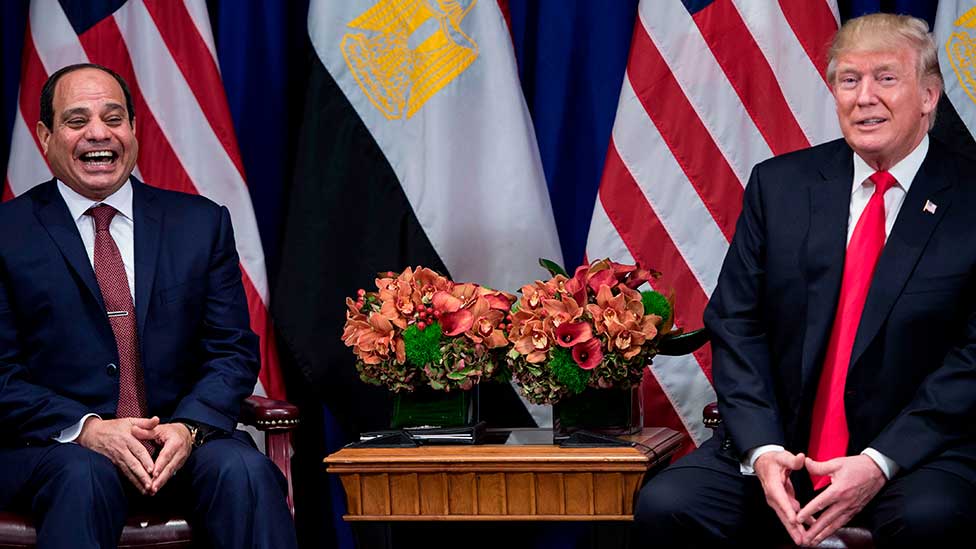
Donald Trump first met Abdul Fattah al-Sisi - a "fantastic guy" - in September 2016 and when he won the election two months later, Mr Sisi was reportedly the first foreign leader to call him.
Their close relationship continued once Mr Trump was in office and President Sisi visited the White House in April 2017 for the first time since he led a military coup in Egypt in 2013.
Human rights groups, however, criticised Mr Trump for meeting a man accused of a violent crackdown against the Muslim Brotherhood group which left more than 1,000 people dead.
But officials said the US was seeking to "reboot" relations between the two countries because President Trump saw a stable Egypt as an invaluable ally in the battle against terrorism.
Mr Sisi, who wants to ensure Egypt continues to receive US military aid worth about $1.3bn a year, has praised President Trump as someone who has a "deep and great understanding" of the Middle East.
The two met again during Mr Trump's first foreign visit to Saudi Arabia in May 2017. At a summit in Riyadh, Mr Trump said Mr Sisi had "done a tremendous job under trying circumstances".
An image of Mr Trump, Mr Sisi and Saudi King Salman placing their hands on a glowing orb at the meeting set social media abuzz.
The US did withhold $195 million in military aid to Egypt in 2017 amid concerns about the country's human rights record - but the funds were released the following year.
Mr Trump has not visited Egypt as president but his wife has been there while first lady. The most memorable moment of Melania Trump's visit, which was part of a whistle-stop tour of Africa in October 2018, was a tour of the Giza pyramids she did sporting a Panama hat.
El Salvador

"They have worked well with us on immigration at the Southern Border!"- @realdonaldtrump, 24 Apr 2020
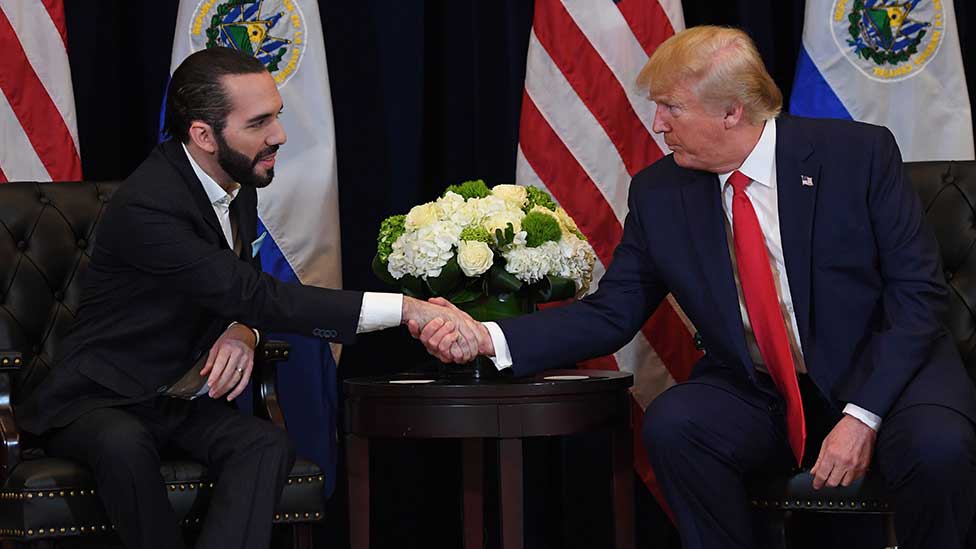
President Trump's relationship with El Salvador got off to a bumpy start when he was reported to have made a controversial remark during a meeting with US lawmakers about a new immigration deal.
Democratic Senator Richard Durbin had just been discussing US temporary residency permits granted to citizens of countries hit by natural disasters, war or epidemics, when Mr Trump asked, "Why are we having all these people from shithole countries come here?"
Mr Trump tweeted that he had used "tough" language but not that specific term. Senator Durbin responded by saying Mr Trump used "racist" language.
Mr Trump's administration announced in January 2018 that it would cancel permits that allow nearly 200,000 people from El Salvador to live and work in the US.
They were granted Temporary Protected Status (TPS) after earthquakes rocked the Central American country in 2001.
Salvadoreans were originally given until January 2020 to leave, face deportation, or find a legal way to stay. But that deadline was extended to January 2021.
President Trump met Salvadorean President Nayib Bukele on the sidelines of the UN General Assembly in September 2019, where he told reporters that the relationship between the two men "has been excellent".
In April this year, Mr Trump tweeted that the US would be helping El Salvador get ventilators amid the coronavirus pandemic, saying: "They have worked well with us on immigration at the Southern Border!"
Ethiopia

"I made a deal, I saved a country, and I just heard that the head of that country is now getting the Nobel Peace Prize for saving the country."- President Trump, at a rally in Ohio, 10 Jan 2020
Ethiopia hasn't featured on Mr Trump's agenda for much of his presidency, but he has caused some controversy in the capital Addis Ababa this year.
In January, President Trump said he deserved a Nobel Peace Prize because he had "made a deal" that "saved a country" - seemingly a reference to negotiations between Ethiopia and Eritrea that ended in a peace deal between the two countries.
Ethiopian Prime Minister Abiy Ahmed won the prestigious prize for his part in the process, which appeared to upset Mr Trump somewhat.
Speaking at a campaign rally in Ohio, the president said: "I made a deal, I saved a country, and I just heard that the head of that country is now getting the Nobel Peace Prize for saving the country... As long as we know, that's all that matters... I saved a big war."
While not integral to the talks between Ethiopia and Eritrea, Mr Trump did play a role in discussions over water resources in the region between Ethiopia, Egypt and Sudan.
Ethiopia is building a huge dam on part of the River Nile within its borders, but this has upset neighbouring Sudan and Egypt who are concerned about water shortages further up the river.
In Addis Ababa, the US is seen as having sided with Egypt on the dispute. The US announced in September that it would cut some aid to Ethiopia after it began filling the reservoir behind the dam in July, while discussions with Egypt and Sudan were still under way.
In October, while on a call with the leaders of Sudan and Israel, Mr Trump said the issue of the dam was a "very dangerous situation because Egypt is not going to be able to live that way," adding: "I say it loud and clear - they'll blow up that dam. And they have to do something."
In response, PM Abiy Ahmed said: "Ethiopia will not cave in to aggression of any kind." He added that threats of any kind over the issue were "misguided, unproductive and clear violations of international law".
Finland

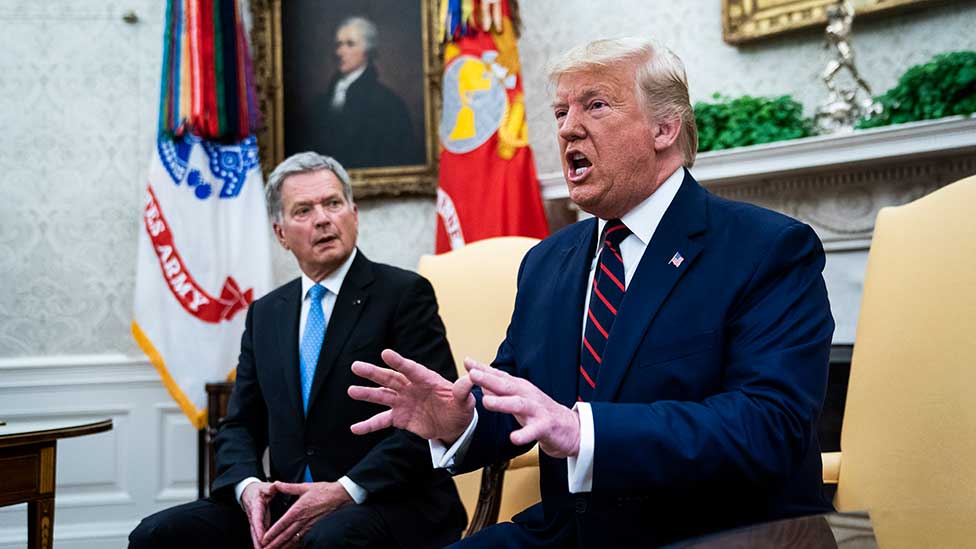
Finland's President Sauli Niinistö was invited to the White House in October 2019 but his relationship with Donald Trump has been fairly low-key.
In fact, his visit was overshadowed by questions surrounding Mr Trump's impending impeachment and much of the leaders' joint press conference was taken up by an angry exchange between the American president and a reporter.
Another notable moment in the relationship came in 2018 amid bad wildfires in California, when Mr Trump said poor management was to blame and pointed towards Finland as a country that managed the risk better.
"I was with the president of Finland," Mr Trump told reporters, "and he said: 'We're a forest nation' and they spent a lot of time on raking and cleaning and doing things, and they don't have any problem."
President Niinisto, however, said he could not remember talking about raking when the two met.
France

"The friendship between our two nations and ourselves is unbreakable."- @realDonaldTrump, 13 Jul 2017
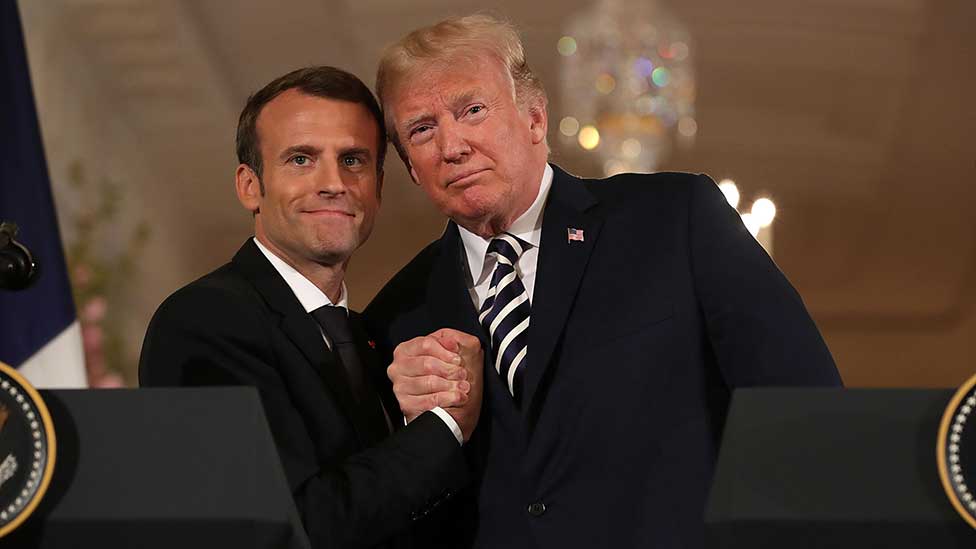
President Trump accepted an invitation to attend 2017's Bastille Day celebrations in France after a somewhat rocky start with the French president.
After the first meeting between the two men in Brussels in May 2017, Mr Macron described his white-knuckled handshake with Mr Trump as "not innocent".
But since then their relationship has warmed, with Mr Trump describing the Bastille Day event as "one of the greatest parades I've ever seen" and saying the US relationship with France was "stronger than ever". Although there was an awkward moment during the trip, when Mr Trump told President Macron and his wife that she was "in such good shape".
President Macron visited the White House in April 2018 and was also given the honour of making an address to the US Congress.
His speech was described as a "thinly veiled rebuke" to President Trump by the BBC's North America editor, Jon Sopel. But despite their differences on policy, they appear to get on well.
There have been several moments of tension though.
In November 2019, President Macron described Nato as "brain dead" because of a waning commitment to the alliance by the US. Mr Trump hit back by saying the French leader had been "nasty" and "very disrespectful".
He also called Mr Macron "foolish" when France moved to introduce a tax on US technology companies and threatened to add a tax on French wine as retaliation, tweeting: "I've always said American wine is better than French wine!" Mr Macron put the new tax on hold.
Georgia

"I extend Georgians my warmest wishes for a productive, secure, and prosperous future."- President Trump, in a letter to Prime Minister Gakharia, 26 May 2020
President Trump's only mention of Georgia on Twitter was in 2017, when he posed for a photo with the country's leader at the time, Giorgi Kvirikashvili, at the White House.
He has not yet met the new Georgian prime minister, Giorgi Gakharia, but he reportedly sent him a letter in May this year to celebrate the country's independence day.
In the letter, President Trump thanked Georgia for its "significant contributions" to the Nato mission in Afghanistan and said the US would continue to support the country's bid to become a Nato member state.
Germany

"We have a really great relationship and we actually have had a great relationship right from the beginning, but some people didn't understand that. But we understand it and that's what's important."- President Trump, talking to reporters alongside Angela Merkel at the White House - 27 Apr 2018
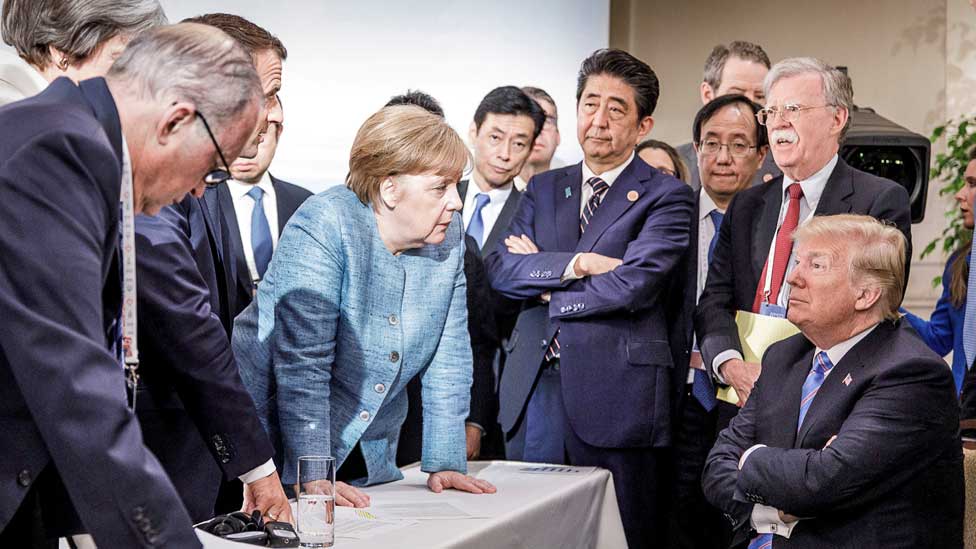
When Donald Trump won the US election he did so with the isolationist slogan of "America First", leading many to declare German Chancellor Angela Merkel as the new leader of the free world.
Her pivotal role in global politics could be seen clearly on the White House call sheet during Mr Trump's first few months in office - she was one of the world leaders he spoke to most frequently and she also paid the new president a visit in March 2017.
President Trump's tone towards Mrs Merkel has changed significantly since he took office. In 2015, he took to Twitter to describe her as the "person who is ruining Germany" after Time magazine picked her as their person of the year.
The German leader clearly noticed Mr Trump's disparaging comments, saying at their joint press conference that she's "always said it's much, much better to talk to one another and not about one another".
The pair have met several times since that first meeting and while Mr Trump has paid tribute to Mrs Merkel in public, his tone on Twitter is often less approving.
President Trump has repeatedly taken issue with Germany failing to spend the Nato target of 2% on defence, accusing the country of being "delinquent" in its payments to the alliance.
He has also accused Germany of being "totally controlled by Russia" because it imports "so much of its energy" from the country and has a new pipeline planned. Mrs Merkel responded by saying Germany "can make our own policies and make our own decisions".
But it has not been empty rhetoric from President Trump. In July this year, the US announced it was withdrawing about 12,000 of its troops from Germany in what officials described as a "strategic" repositioning of its forces in Europe.
Mr Trump's explanation was a little more direct, telling reporters: "We don't want to be the suckers anymore. We're reducing the force because they're not paying their bills; it's very simple."
Greece

"Ancient Greece achieved extraordinary feats of architecture, geometry, map-making, and so much else that has inspired all wonders of the world. And Greece is the birthplace of democracy. Have you heard that?"- President Trump, at a Greek Independence Day celebration at the White House, 18 Mar 2018
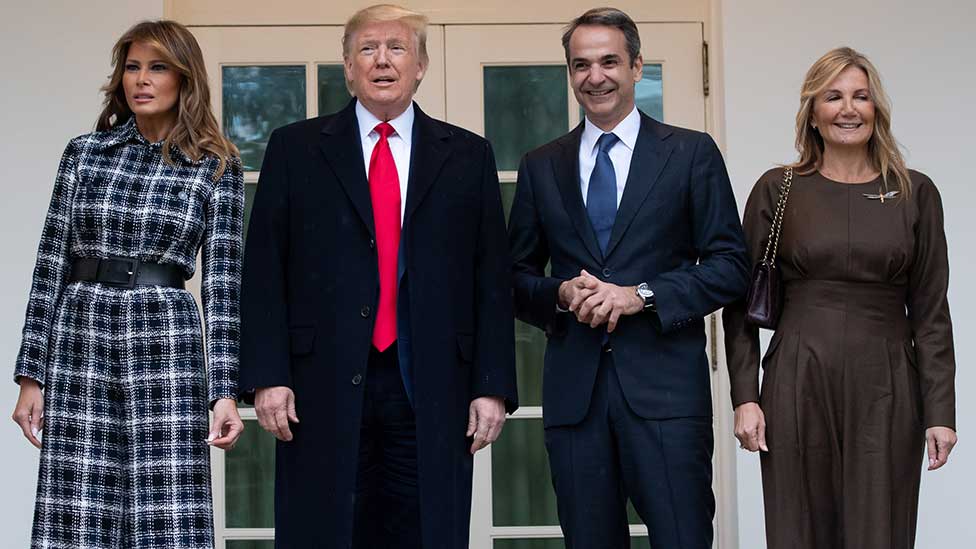
The visit of Greek Prime Minister Alexis Tsipras to the White House in October 2017 could have been awkward, as he had previously criticised Mr Trump and even called him "evil".
But the two held a cordial joint press conference and Mr Trump joked about the Greek leader's past remarks: "I wish I knew before my speech."
Mr Tsipras said the two had a productive exchange and he shared common values with the US.
The Greek prime minister was replaced by Kyriakos Mitsotakis in January 2019 and Mr Trump hosted him and his wife at the White House a year later.
Speaking in the Oval Office, Mr Trump said the relationship between the two countries was "really extraordinary" and said Greece had made a "tremendous comeback" after its financial crisis.
Mr Mitsotakis will have charmed the president by comparing his economic policy to Mr Trump's, saying: "The Greek economy has done extremely well over the past months. We have lowered taxes. We are deregulating. We're following a recipe that has also worked here."
The pair spoke again on the phone in August this year, with Mr Trump expressing concerns about rising tension between Greece and Turkey.
In September, US Secretary of State Mike Pompeo met Mr Mitsotakis during a visit to a US naval base on the Greek island of Crete and said: "The relationship between our two countries is at an all-time high and getting stronger."
Haiti

"Why do we need more Haitians? Take them out."- President Trump's widely reported comments made in private during a meeting on immigration, 11 Jan 2018
Mr Trump's reported remark came as lawmakers from both parties visited him to propose a bipartisan immigration deal. He tweeted that he had "never said anything derogatory about Haitians other than Haiti is, obviously, a very poor and troubled country. Never said 'take them out.'"
Democratic Senator Richard Durbin had just been discussing US temporary residency permits granted to citizens of countries hit by natural disasters, war or epidemics, when Mr Trump reportedly asked, "Why are we having all these people from shithole countries come here?"
Mr Trump tweeted that he had used "tough" language but not that specific term. Senator Durbin responded by saying Mr Trump used "racist" language.
Haiti's US Ambassador Paul Altidor told the BBC the idea that "we're simply immigrants who come here to take advantage of the US" is wrong.
In 2017, the Department of Homeland Security announced that Temporary Protected Status (TPS) designation, granted to Haitians following the 2010 earthquake, would end in July 2019.
The move was initially deemed unlawful but in September 2020, an appeals court sided with the Trump administration, meaning those with TPS could be forced to leave the US early next year.
Joe Biden, Mr Trump's Democratic rival in the election, has vowed to reverse the decision if he wins.
Honduras

"Why are we having all these people from shithole countries come here?"- President Trump's widely reported comments made in private during a meeting on immigration, 11 Jan 2018
Mr Trump's reported remark came as lawmakers from both parties visited him to propose a bipartisan immigration deal.
Democratic Senator Richard Durbin had just been discussing US temporary residency permits granted to citizens of countries hit by natural disasters, war or epidemics, when Mr Trump asked: "Why are we having all these people from shithole countries come here?"
Mr Trump tweeted that he had used "tough" language but not that specific term. Senator Durbin said Mr Trump used "racist" language and that the president did call some African nations "shitholes".
President Trump has sought to decrease the number of migrants coming into the country from Latin America, threatening to cut aid to Honduras unless its government stopped large caravans of people heading towards the US.
He has also tried to reduce the number of Hondurans already in the country, with his administration announcing in June 2018 that it was ending the Temporary Protection Status (TPS) that had granted nearly 60,000 Hondurans the right to live in the US.
Hondurans were granted this status after Hurricane Mitch hit the Central American country in 1998, but the Department of Homeland Security said conditions in the country had "notably improved" since the disaster.
At the moment, the TPS for Hondurans in the US is due to end in January 2021, but Joe Biden, Mr Trump's Democratic rival in the election, has vowed to reverse the decision if he wins.
India

"The First Lady and I have just traveled 8,000 miles around the globe to deliver a message to every citizen across this nation: America loves India, America respects India, and America will always be faithful and loyal friends to the Indian people."- President Trump, at a rally in Ahmedabad, India, 24 February 2020
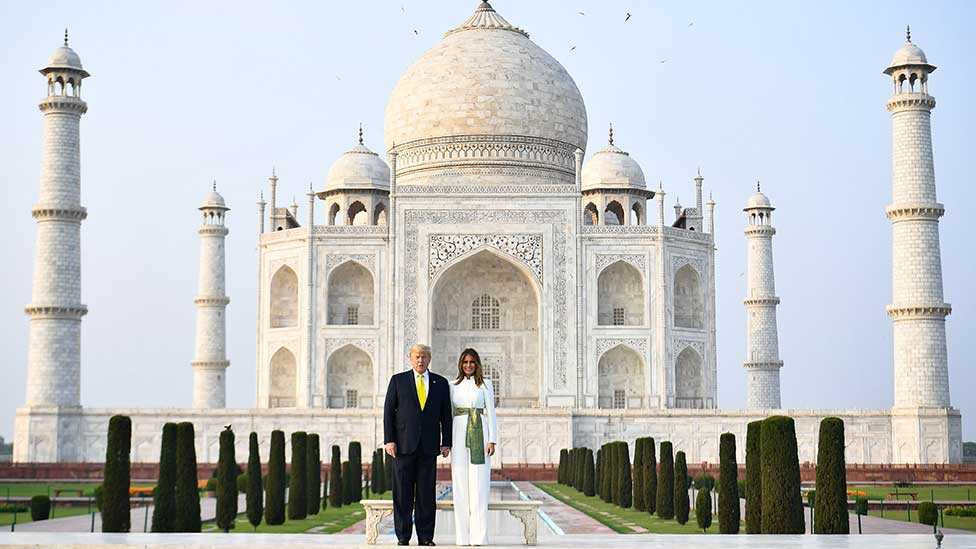
President Trump has met Prime Minister Narendra Modi several times and the pair appear to have developed a strong relationship.
At the White House in June 2017, the two leaders shared a warm embrace in front of reporters before vowing to fight terrorism together and praising US-India relations.
"The relationship between India and the United States has never been stronger, never been better," said Mr Trump, who described himself and Mr Modi as "world leaders in social media".
President Trump dispatched his daughter Ivanka to India in November 2017 for what was described by local media as a "royal visit", with officials in Hyderabad removing beggars from the streets and rushing through road repairs before she arrived.
But the president himself finally visited the country in February this year and was welcomed by huge crowds everywhere he went.
Mr Modi organised a huge event to honour President Trump - thought to have cost more than $13m - with 100,000 people turning up to hear the two men speak. Although, most of them were on their way out by half-way through Mr Trump's speech.
During the speech, Mr Trump spoke of increasing defence cooperation between the two countries and said India had agreed to buy helicopters and other US military equipment worth $3bn. He told the crowd: "I believe that the United States should be India's premier defence partner, and that's the way it's working out."
The pair were unable to agree a trade deal during President Trump's visit though, but they announced that negotiations would continue. Trade has been the major hiccup to their relationship so far, with Mr Trump complaining in 2019 that Indian tariffs on US products were "unacceptable".
Another recent move that will have strained relations between the two was Mr Trump's late-night Twitter announcement in April that he was suspending immigration into the US in a bid to ease unemployment among Americans due to the coronavirus pandemic.
The move included the H-1B visa, which allows US companies to employ highly-skilled foreign workers and is widely used by the technology sector. Indians reportedly make up nearly 70% of the 85,000 H-1B visas issued every year.
Indonesia

"We've become friends, and we're going to be doing a lot of deals together."- President Trump, speaking before a meeting with Joko Widodo at a G20 summit, 8 Jul 2017
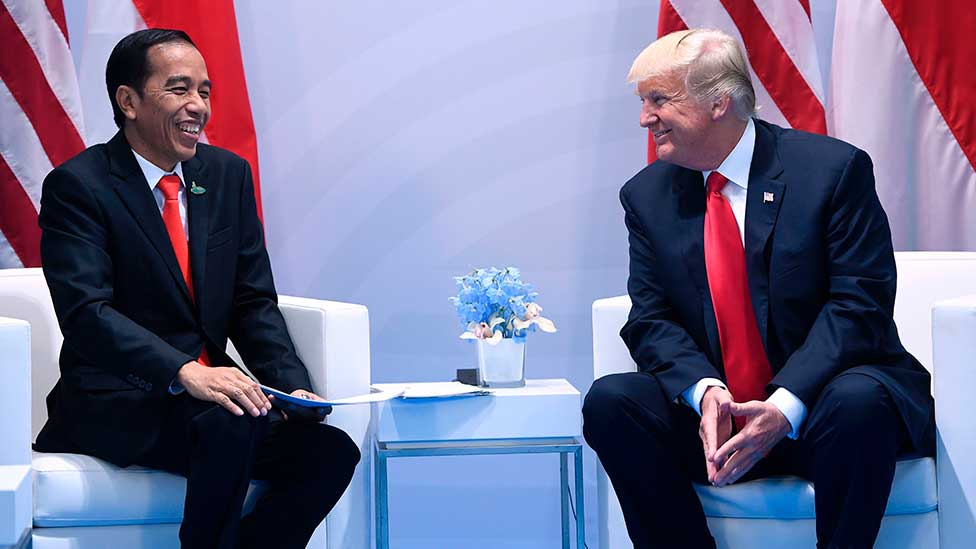
Mr Trump and Indonesia's President Joko Widodo have met a few times at international and regional summits.
The only mention Mr Widodo has had in the president's tweets was in April this year when Mr Trump said his "friend" had asked for ventilators to help cope with the coronavirus pandemic, which the US would provide. "Great cooperation between us!" he added.
Mr Widodo didn't get an invitation to Mr Trump's inauguration in 2017, but Indonesian businessman Hary Tanoesoedibjo reportedly did and the president's relationship with him has raised some eyebrows in the US.
"I don't know whether I am the only Indonesian who was invited, but I didn't see any other over there," he told Indonesian magazine Tempo in February 2017.
Mr Tanoesoedibjo is overseeing the development of a Trump Hotel in West Java and another resort in Bali and he told the magazine he has "close access" to the US president.
In June 2019, it was reported that President Trump had sold a mansion he owned in Los Angeles to Mr Tanoesoedibjo for some $13.5 million.
Iran

"Any attack by Iran, in any form, against the United States will be met with an attack on Iran that will be 1,000 times greater in magnitude!"- @realDonaldTrump, 15 Sep 2018
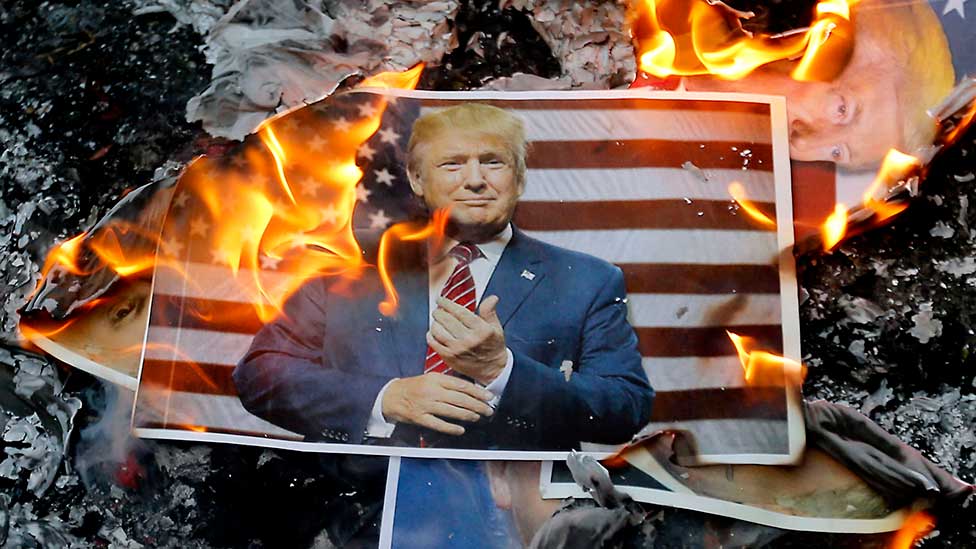
While Donald Trump hasn't spoken to Iran's leader since coming to power, he has spent a lot of his time talking about the country.
One of his administration's first moves was to impose new sanctions against the country in response to a ballistic missile test, which Tehran said had not violated a UN resolution on its nuclear activities.
The US confirmed that Tehran was continuing to comply with the UN agreement but Mr Trump labelled it a "terrible deal" and ordered a review into it nonetheless.
During a trip to Israel in 2017, Mr Trump said Iran "must never be allowed to possess a nuclear weapon - never, ever - and must cease its deadly funding, training and equipping of terrorists and militias."
He later claimed in a tweet that Iran was working with North Korea to develop nuclear weapons.
Then in May 2018, President Trump finally decided to pull out of the UN agreement with Iran, saying: "It is clear to me that we cannot prevent an Iranian nuclear bomb under the decaying and rotten structure of this deal."
Going against advice from European allies, he said he would reimpose economic sanctions that were waived when the deal was signed in 2015.
In June 2019, Iran announced it would ignore some elements on the deal and begin ramping up enrichment of low-grade uranium. President Trump responded on Twitter by saying: "Be careful with the threats, Iran. They can come back to bite you like nobody has been bitten before!"
Then in December 2019, the rhetoric turned into violence when the US conducted air strikes in Iraq and Syria against an Iran-backed Iraqi militia blamed for an attack that killed a US civilian contractor.
In response, protesters attacked the US embassy in Baghdad and Mr Trump said Iran was responsible, tweeting: "They will pay a very BIG PRICE! This is not a Warning, it is a Threat."
Then just a couple of days later, a US air strike in Iraq killed Iran's most powerful military commander, General Qasem Soleimani.
Iran's Supreme Leader Ayatollah Ali Khamenei promised "severe revenge" on those behind the attack and missiles were fired at air bases housing US forces in Iraq.
In September, Mr Trump tweeted about reports that Iran was preparing to retaliate for the killing of Gen Soleimani and said any attack on the US would be met with an attack on Iran "that will be 1,000 times greater in magnitude!"
Iraq

"Frankly, I didn't think [the Iraq war] was a good idea... But we were there, and now we're getting out. We'll be leaving shortly."- President Trump, talking to Prime Minister Kadhimi at the White House, 20 Aug 2020
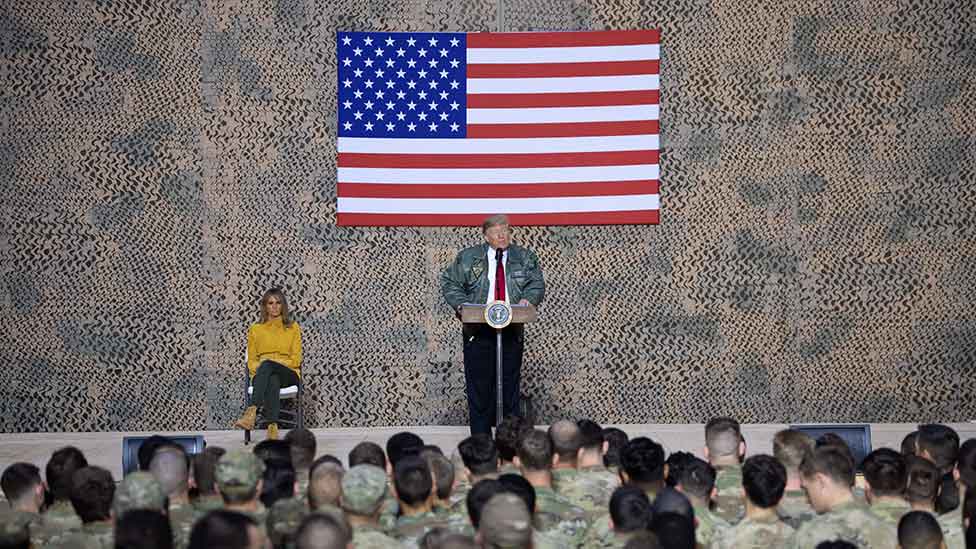
Donald Trump made defeating the so-called Islamic State group (IS) the focus of much of his campaign, so Iraq was central to his initial foreign policy objectives in office.
However, his relationship with Iraq's leaders got off to a bumpy start when he called for a ban on the travel of people from seven predominantly Muslim countries, including Iraq. Eventually, however, Iraq was taken off the list after it agreed to conditions from the US government.
That omission came after Iraqi Prime Minister Haider al-Abadi spoke to President Trump over the phone in February 2017 amid a large-scale offensive by his army to retake the city of Mosul from IS fighters.
Mr Abadi travelled to the US a few weeks later for a meeting at the White House, when President Trump told reporters: "Our main thrust is we have to get rid of [IS]. We're going to get rid of [IS]. It will happen. It's happening right now."
In July 2018, Mr Abadi formally declared victory over IS in Mosul and Mr Trump congratulated his Iraqi counterpart, saying the city had been "liberated from its long nightmare" under the rule of IS.
Battles against IS continued into 2019, but a happy President Trump presented a map in March of that year showing how their territory had been eradicated since he came into office, telling reporters: "So that's the way it goes."
Then in October 2019, Mr Trump announced IS leader Abu Bakr al-Baghdadi had killed himself during a US military operation in Syria, saying he had been "violently eliminated" and "died like a coward". The president later praised a US military dog for the "wonderful job" it did in the operation, tweeting a photo that he said had been declassified.
Despite the successful operation against IS forces, there was some tension between the US and Iraq later in 2019.
When a US air strike in Baghdad killed Iranian General Qasem Soleimani, Iraq's parliament called on US troops to leave the country. Mr Trump threatened Iraq with "sanctions like they've never seen before" and US troops remained in the country.
President Trump is now talking about US troops in Iraq returning home though. During a meeting with the country's new prime minister, Mustafa al-Kadhimi, President Trump said: "We're going to be leaving, and hopefully we're going to be leaving a country that can defend itself."
In September, the US announced it was reducing its force in the country that month from about 5,200 to 3,000.
Ireland

"Very popular man doing a wonderful job. The people love him, and that's very important."- President Trump, talking to reporters alongside Prime Minister Varadkar, 14 Mar 2019
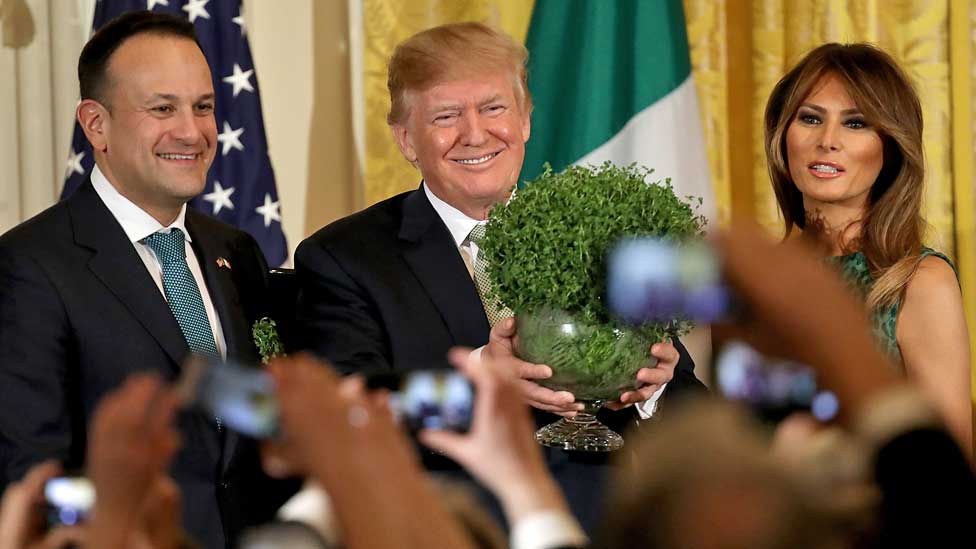
The Trump administration's plans to toughen America's immigration laws have been focused on Latin America and the Middle East, but thousands of unregistered Irish immigrants in the US have also been concerned.
Former Irish Prime Minister Enda Kenny raised this issue with President Trump when he visited the White House in March 2017, saying there were "millions out there who want to... make America great."
Mr Trump met the new taoiseach, Leo Varadkar, at the White House's St Patrick's Day celebrations in March 2018, saying the two had "become friends - fast friends - over a short period of time".
After the meeting at the White House, Mr Varadkar said there was "enthusiasm from the administration to work on a solution" for the thousands of undocumented Irish immigrants that are in the US.
President Trump did visit Ireland in June 2019, telling reporters during the trip: "We love the Irish, so it's an honour to be here." Mr Trump spent two nights at the golf resort he owns in Doonbeg, County Clare, during the trip - where his sons paid a visit to a local pub.
Despite the pair's good relationship, Mr Varadkar was critical of the US earlier this year when he said there had been an "absence of moral leadership" in the wake of protests over the killing of unarmed black men by white police officers.
Israel

"I will always stand with the State of Israel and the Jewish people. I strongly support their safety and security and their right to live within their historical homeland. It's time for peace!"- @realDonaldTrump, 28 Jan 2020
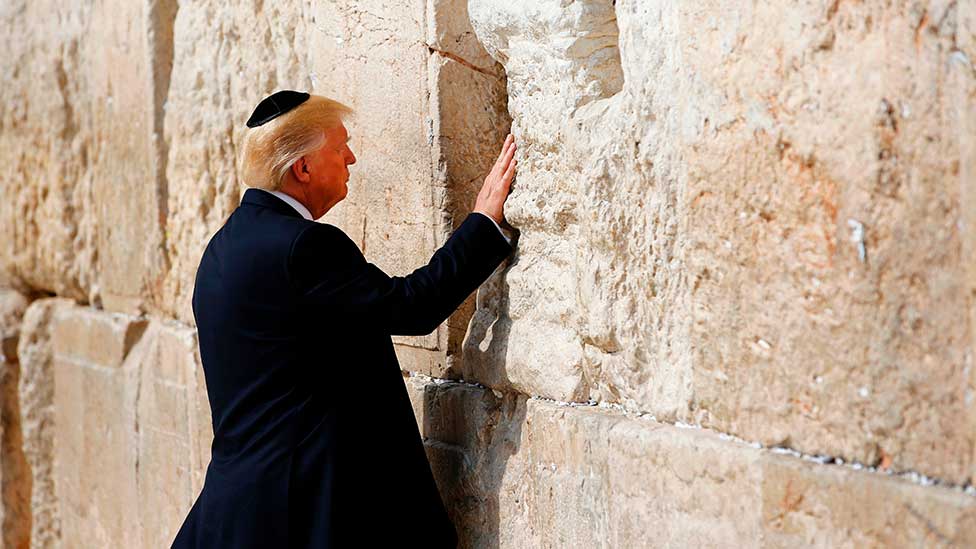
President Trump looked set to follow a fairly traditional path in his relationship with America's closest ally, Israel.
He was quick to invite Prime Minister Benjamin Netanyahu to the White House and during a visit to Tel Aviv in May 2017, he said he had come to "reaffirm the unbreakable bond" between the two countries.
In August that year, Mr Trump tweeted that "Peace in the Middle East would be a truly great legacy for ALL people!"
But by December he had chosen a new path, recognising Jerusalem as Israel's capital, to the amazement of much of the international community. Palestinian President Mahmoud Abbas called the move "deplorable" and said the US could no longer be a peace broker.
Mr Trump pushed ahead with the decision though and in May 2018, his daughter Ivanka was part of a delegation dispatched to open a new US embassy in Jerusalem.
Marking the one year anniversary of the opening, President Trump tweeted in May 2019: "Our beautiful embassy stands as a proud reminder of our strong relationship with Israel and of the importance of keeping a promise and standing for the truth."
In a sign of his warm relationship with Mr Netanyahu, the president congratulated him on becoming the country's longest serving prime minister in July 2019, tweeting that he had "led Israel with a commitment to the values of democracy, freedom, and equal opportunity that both our nations cherish and share!"
In January 2020, President Trump unveiled his long-awaited "vision for peace, prosperity and a brighter future for the Israelis and Palestinians". Mr Netanyahu called the plan the "opportunity of the century" but the Palestinian president dismissed it as the "slap of the century".
In September, Mr Trump hailed the "dawn of a new Middle East" after the United Arab Emirates and Bahrain signed agreements fully normalising their relations with Israel - becoming just the third and fourth Arab countries to recognise Israel since its founding in 1948.
Italy

"Just met the new Prime Minister of Italy, @GiuseppeConteIT, a really great guy. He will be honored in Washington, at the @WhiteHouse, shortly. He will do a great job - the people of Italy got it right!"- @realDonaldTrump, 9 Jun 2018
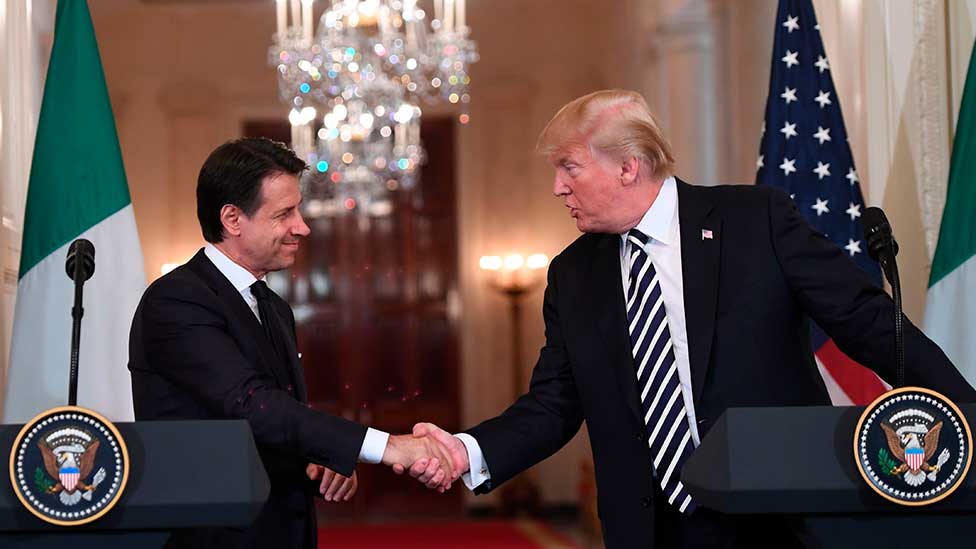
President Trump has dealt with two Italian prime ministers during his time in the White House.
The first, Paolo Gentiloni, was welcomed to Washington DC in April 2017 and his relationship with Mr Trump appeared amicable enough.
But the president was clearly happier after meeting Giuseppe Conte, the leader of a populist coalition who became Italy's 58th prime minister in June 2018.
After a brief meeting at the G7 summit in Canada, during which Mr Conte backed Mr Trump's call for Russia to be readmitted to the group, the US president called Mr Conte a "great guy".
The two leaders have some similarities in their policies, with Mr Trump tweeting in 2018 that he'd spoken to Mr Conte about Italy's "very hard line on illegal immigration" and said: "I agree with their stance 100%, and the US is likewise taking a very hard line on illegal immigration."
In March this year, Mr Trump tweeted a video of Italian air force jets creating their national flag with coloured smoke and said: "THE UNITED STATES LOVES ITALY!" The display came amid a rising death toll from the coronavirus pandemic in Italy.
President Trump visited the country twice in quick succession in May 2017 and he also travelled to Vatican City where he met with Pope Francis, which he described as the "honour of a lifetime".
Jamaica

"Even Usain Bolt from Jamaica, one of the greatest runners and athletes of all time, showed RESPECT for our National Anthem!"- @realDonaldTrump, 27 Sep 2017
Amid the NFL national anthem controversy in 2017, President Trump singled out Jamaican sprinter Usain Bolt as an example for other sportspeople to follow.
He tweeted: "Even Usain Bolt from Jamaica, one of the greatest runners and athletes of all time, showed RESPECT for our National Anthem!"
Mr Trump had criticised NFL players who kneel during the national anthem as a protest, to highlight the treatment of black Americans.
Japan

"Just had a wonderful conversation with my friend, Prime Minister @AbeShinzo of Japan, who will be leaving office soon. Shinzo will soon be recognized as the greatest Prime Minister in the history of Japan, whose relationship with the USA is the best it has ever been. Special man!"- @realDonaldTrump, 31 Aug 2020
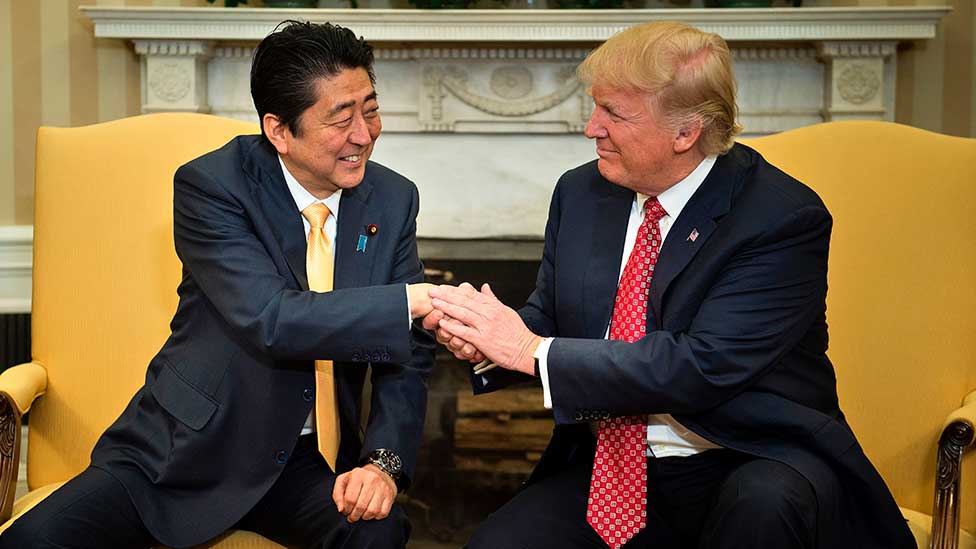
Japan's Prime Minister Shinzo Abe has developed a strong relationship with President Trump, with the pair having met several times both in the US and in Japan.
Mr Abe has visited Mr Trump's Mar-a-Lago resort in Florida twice and paid several visits to the White House. Mr Trump spoke to the Japanese leader frequently throughout his first two years in office, mainly to discuss US negotiations with North Korea.
Golf has been a key part of their relationship and they've managed to fit in several rounds, playing in Florida and also in Virginia.
The pair also found time for a round of golf when President Trump visited Japan in November 2017 - although Mr Abe may want to forget about that after he took a tumble into a bunker.
Mr Trump was keen to land a new trade deal with Japan, tweeting in 2019 that Mr Abe has been "working with me to help balance out the one-sided Trade with Japan".
The two countries did agree an initial deal focusing on agriculture in September that year, with President Trump calling it a "tremendous" agreement.
Prime Minister Abe resigned for health reasons in August 2020, with Mr Trump saying he would soon be "recognised as the greatest Prime Minister in the history of Japan".
Jordan

"I am deeply committed to preserving our strong relationship & to strengthening America's long-standing support for Jordan"- @realDonaldTrump, 5 Apr 2017
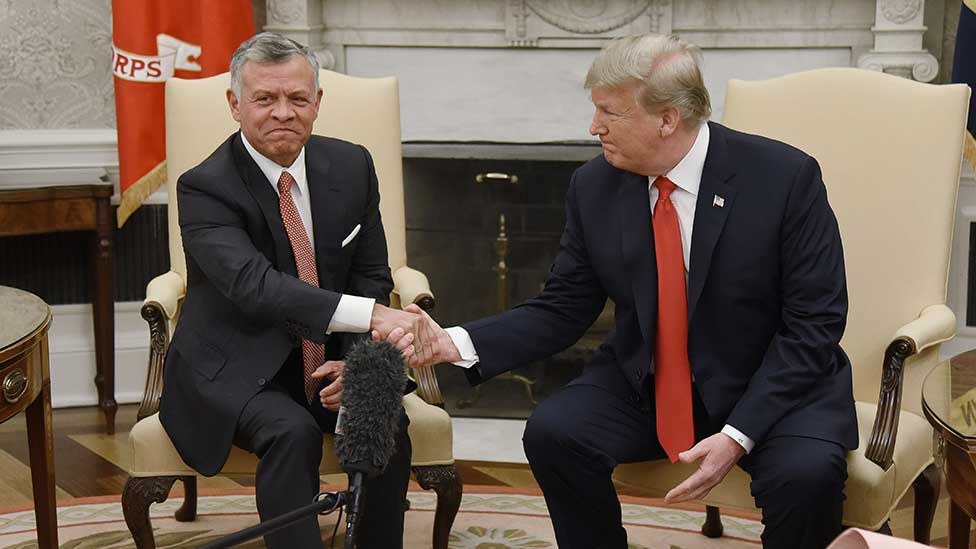
Jordan's King Abdullah was the first Arab leader to meet President Trump and has had several meetings since.
The first occasion came in February 2017 on the sidelines of the National Prayer Breakfast, an annual event held in Washington DC, and appeared to be little more than a brief conversation.
King Abdullah was invited back to the capital in April that year for an official meeting with President Trump at the White House and he was back in Washington DC in June 2018 as well.
Jordan was a key member of the US-led coalition in the fight against the so-called Islamic State group in Iraq and Syria and Mr Trump has praised the king and his armed forces for their help.
"Jordanian service members have made tremendous sacrifices in this battle against the enemies of civilisation, and I want to thank all of them for their, really, just incredible courage," Mr Trump said.
The relationship was strained in late 2017 though, when President Trump announced that the US would be recognising Jerusalem as the capital of Israel and moving its embassy there. King Abdullah said the decision would "undermine efforts to resume the peace process".
Kenya

"One of the most beautiful countries, from what I understand, Mr. President. We have lots of pictures and lots of people that tell me how beautiful your country is."- President Trump speaking at a joint press conference with President Kenyatta at the White House, 27 Aug 2018
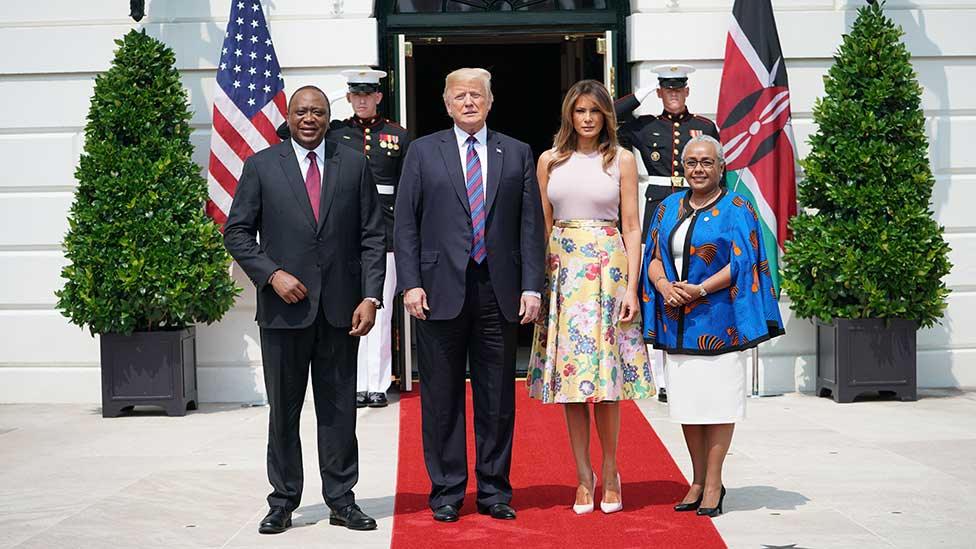
US relations with Kenya were always likely to be very different under Donald Trump to how they were under Barack Obama, whose father was Kenyan.
When Mr Trump entered office in 2017, his decision to speak to the leaders of three African nations - Egypt, Nigeria and South Africa - before speaking to Kenya's President Uhuru Kenyatta was taken as a snub by some in the country.
When they did speak, the two leaders discussed security in the region and President Trump praised Kenya's "significant contributions" to the African Union force fighting against the al-Shabaab group in neighbouring Somalia.
While President Trump has not visited the country - or any others in Africa - First Lady Melania Trump did stop in Kenya briefly during her whirlwind tour of the continent in October 2018.
But her decision to wear a pith helmet while on safari caused some controversy.
Kuwait

"A leader in the Middle East for decades, the emir has been a truly unwavering friend and partner to the United States."- President Trump, in a statement awarding a top US honour to the Kuwati emir, 18 Sep 2020
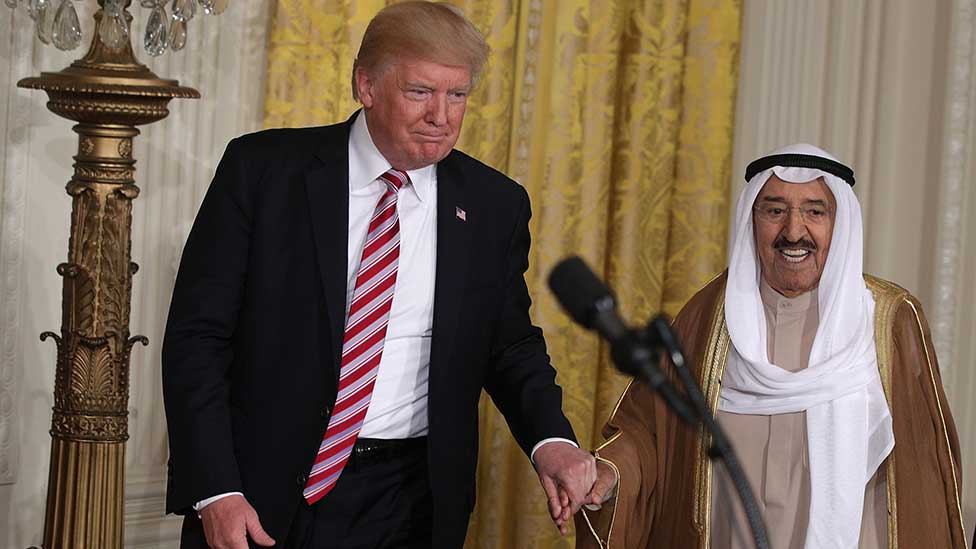
President Trump met the emir of Kuwait, Sheikh Sabah al-Ahmad al-Jaber al-Sabah, for the first time during his May 2017 visit to Saudi Arabia.
He called the leader a "special person" and said Kuwait's purchasing of "tremendous amounts of our military equipment" means "jobs, jobs, jobs" for Americans.
The emir then visited the White House later that year and held a joint press conference, during which Mr Trump claimed the relationship between the US and Kuwait "has never been stronger - never, ever".
President Trump also referenced the "tremendous investments" that Kuwait has made in the US, especially in plane sales. Mr Trump lamented to New York and New Jersey politicians after the press conference that his plane was not as big as the emir's, according to Politico.
The Kuwaiti emir visited the White House again in 2018, when President Trump described him as "a very special friend of mine".
Earlier this year, while the emir was being treated for an illness in the US, Mr Trump awarded him the Legion of Merit, a rarely awarded honour, saying he had "been a truly unwavering friend and partner to the United States" and an "unparalleled diplomat".
The emir died at the age of 91 in September.
Libya

"A lot of countries are involved with respect to Libya. And it's, right now, a mess."- Donald Trump, speaking to reporters at the White House, 7 Jan 2020
Mr Trump cited Libya as an example of the failure of Western military intervention regularly on his way to winning the US election, but the record shows he backed action at the time.
He hosted Libyan Prime Minister Fayez Al-Sarraj at the White House in December 2017, where the pair "agreed to work together to advance Libyan stability and unity".
The country has been beset by chaos since Nato-backed forces helped rebel fighters overthrow long-serving ruler Col Muammar Gaddafi in October 2011.
But the US leader has been keen to take a less engaged approach to the country's problems, telling reporters in 2017 that he did not "see a role" there for the US.
Since then, however, the country has become a battleground for regional powers with Turkey and Russia backing opposing forces. Mr Trump has appeared keen not to get involved in the ground war.
A statement from Robert O'Brien, his national security adviser, in August said the US was deeply troubled by the "escalating conflict" but remained an "active, but neutral, actor".
Mexico

"With Mexico being one of the highest crime Nations in the world, we must have THE WALL. Mexico will pay for it through reimbursement/other."- @realDonaldTrump, 27 Aug 2017
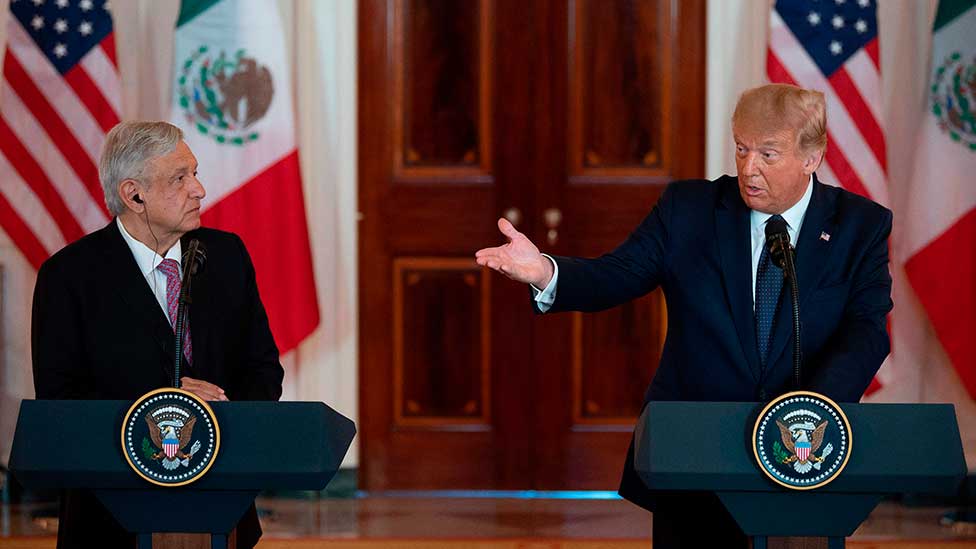
No Donald Trump rally during his 2016 election campaign was complete without the crowd chanting: "Build the wall, build the wall!"
It was the policy that defined Mr Trump's insurgent run for office, so it was little surprise that who would pay for the wall caused a diplomatic dispute just days into his presidency.
Mr Trump, who has said repeatedly that Mexico will pay for it, officially announced his intention to build the wall in an executive order signed on 25 January 2017.
Two days later, Mexican President Enrique Peña Nieto used a televised address to tell Mr Trump: "I've said time and again: Mexico won't pay for any wall."
Mr Peña Nieto and Mr Trump unsurprisingly had a bumpy relationship at best. The Mexican leader was due to visit the White House but twice cancelled planned trips because of disagreements with the US president.
But Mr Trump appears to have changed tack with Andrés Manuel López Obrador, who became the new Mexican president in 2018. They spoke for the first time in July that year, with Mr Trump saying he had predicted Mr Obrador would become president of Mexico years earlier.
In 2019, President Trump turned up the rhetoric once again, accusing Mexico of having "taken advantage of the United States for decades" and threatening to put tariffs on their goods.
But after negotiations, the two countries signed a deal that required Mexico to deploy troops along its southern border with Guatemala to stem the flow of migrants heading for the US.
Earlier this year, Mr López Obrador said President Trump had "completely changed his rhetoric" towards the country, telling a reporter: "The relationship with President Trump is very good and, as I said yesterday, he has treated us like friends, not as distant neighbours."
New Zealand

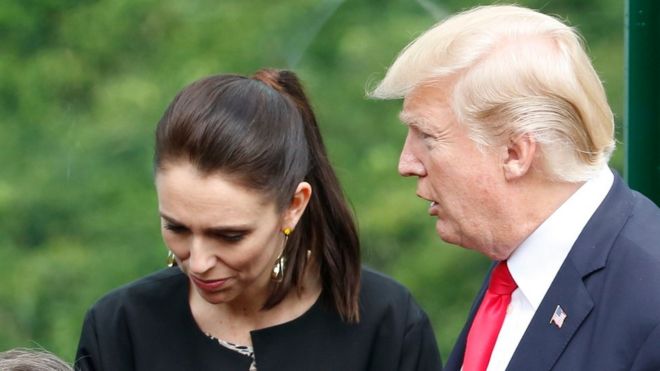
A few months after Jacinda Ardern became prime minister of New Zealand, the headline of a feature about her in Vogue magazine called her "young, forward-looking, and unabashedly liberal - call her the Anti-Trump".
So it should come as no surprise that Ms Ardern and Mr Trump have not become best friends - but their relationship has appeared amicable enough most of the time.
The pair met for the first time at a summit in Vietnam in 2017, where Ms Ardern said President Trump joked to someone else present that she had "caused a lot of upset in her country" with her election win. She replied: "You know, no-one marched when I was elected."
When New Zealand suffered from a terrorist attack in March 2019, Mr Trump said he had spoken to Prime Minister Ardern and told her "we stand in solidarity with New Zealand – and that any assistance the USA can give, we stand by ready to help. We love you New Zealand!"
The two leaders had a private meeting on the sidelines of the UN General Assembly in New York in September 2019, with Mr Trump describing it as "wonderful".
But there has been some tension recently, specifically over the two countries' different approach to dealing with the coronavirus pandemic.
In August this year, Mr Trump alleged New Zealand was experiencing a "big surge" in cases but Ms Ardern said his comparison of her country and the US was "patently wrong". On the day of Mr Trump's remark, the US recorded 40,000 new cases while New Zealand had just nine.
And in October, when Ms Ardern was asked whether President Trump had called to congratulate her on an historic election victory, she told reporters: "I don't tend to have those direct communications with the president of the United States."
Nicaragua

"Why are we having all these people from shithole countries come here?"- President Trump's widely reported comments made in private during a meeting on immigration, 11 Jan 2018
Mr Trump's reported remark came as lawmakers from both parties visited him to propose a bipartisan immigration deal, in part to deal with an influx of migrants from Central America.
Democratic Senator Richard Durbin had just been discussing US temporary residency permits granted to citizens of countries hit by natural disasters, war or epidemics, when Mr Trump asked: "Why are we having all these people from shithole countries come here?"
Mr Trump tweeted that he had used "tough" language but not that specific term. Senator Durbin responded by saying Mr Trump used "racist" language.
Mr Trump's administration announced in November 2017 that it would remove the Temporary Protected Status (TPS) designation for Nicaragua, introduced in 1999 after Hurricane Mitch devastated Central America.
At the moment, the TPS for Nicaraguans in the US is due to end in January 2021, but Joe Biden, Mr Trump's Democratic rival in the election, has vowed to reverse the decision if he wins.
Nigeria

"I'd like very much to visit Nigeria. It's an amazing country. And in certain ways, I hear, from the standpoint of the beauty of a country, there's no country more beautiful."- President Trump, during a joint press conference with Mr Buhari at the White House, 30 Apr 2018
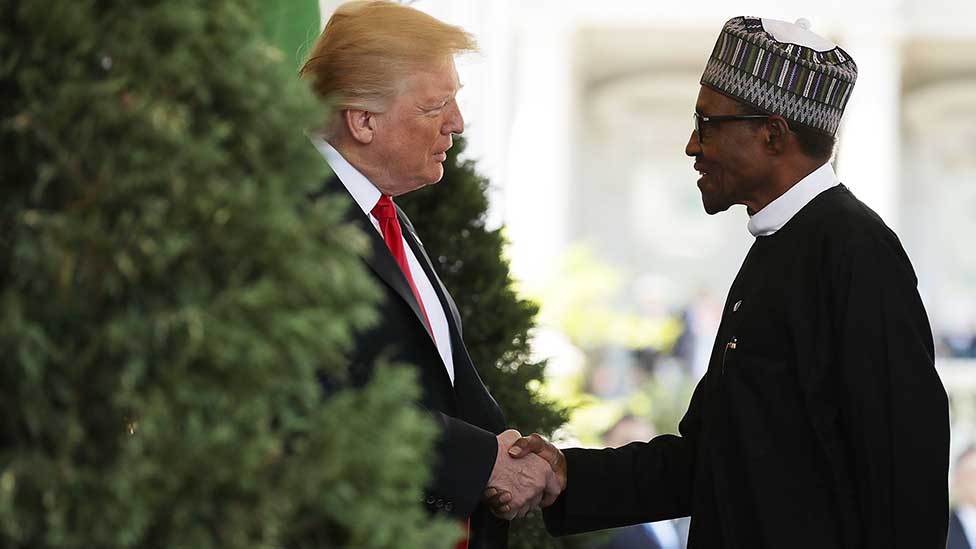
President Trump caused some controversy when he first spoke to Nigeria's President Muhammadu Buhari over the phone in February 2017.
During the call, Mr Trump signalled his intention to renew a deal to sell military aircraft put on hold by the Obama administration after Nigerian forces mistakenly bombed a refugee camp in the country's north-east, killing more than 100 people.
Meeting President Buhari for the first time at the White House in April 2018, Mr Trump said the aircraft would help "improve Nigeria's ability to target terrorists and protect civilians".
The controversial deal went ahead, despite some concerns from members of Congress, and the aircraft are due to be delivered in 2021.
There was an awkward moment for both leaders at that joint press conference in 2018 when a journalist asked about reports that Mr Trump had referred to some African countries as "shitholes".
President Buhari sidestepped the question, saying he was unsure of the report's validity, but Mr Trump didn't deny he'd made the comment.
"The [Nigerian] president knows me and he knows where I'm coming from," Mr Trump said. "And you do have some countries that are in very bad shape and very tough places to live in."
Earlier this year, President Trump expanded his administration's curbs on immigration to include six more countries, including Nigeria, reportedly due to them not meeting US security and information-sharing standards.
In response, President Buhari said the country would work to fix the issues in order to maintain "productive relations" with the US.
North Korea

"Chairman Kim has a great and beautiful vision for his country, and only the United States, with me as President, can make that vision come true."- @realDonaldTrump, 2 Aug 2019
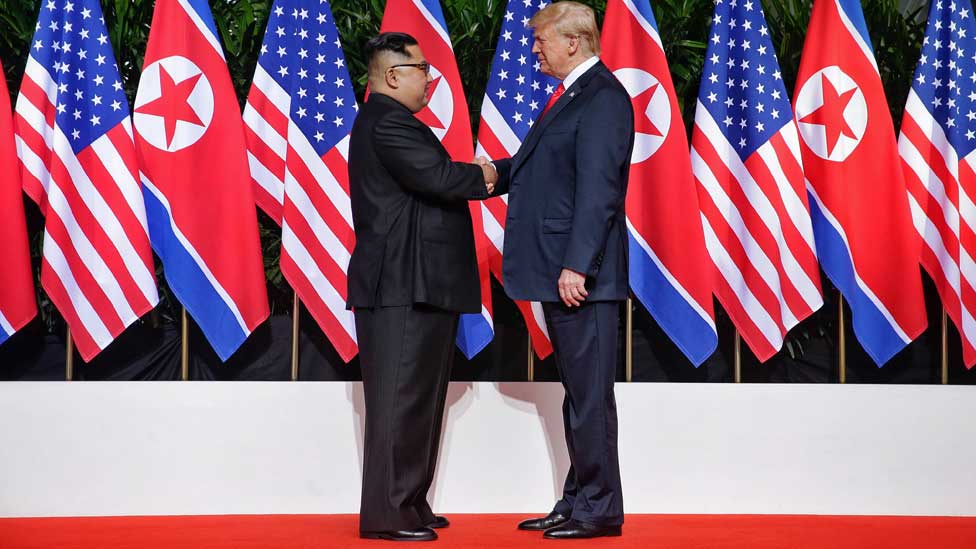
President Trump made history in June 2018 when he became the first sitting US president to meet with a North Korean leader.
It was an event few could have imagined just a few months after Mr Trump had threatened to unleash "fire and fury like the world has never seen" if North Korea endangered the US.
The heated rhetoric from Mr Trump was in response to North Korea's repeated testing of long-range missiles in its pursuit to establish itself as a nuclear power. North Korea responded by vowing to launch a "nuclear pre-emptive strike" if it felt at risk.
Mr Trump and Kim Jong-un then traded insults for a few months - including the president tweeting that he had a "nuclear button" and it was "much bigger and more powerful one than his" - as military conflict began to look inevitable. But then all of a sudden, the tone changed.
In 2018, Mr Trump signalled that he would be willing to sit down with Mr Kim and eventually the long-awaited summit happened in Singapore in June, with the US president thanking the North Korean leader for taking "the first bold step toward a bright new future for his people".
The pair signed an agreement that while historic, was a little short on details. It committed North Korea to work towards "the complete denuclearisation of the Korean peninsula" and promised "new relations" between Washington and Pyongyang.
They met again in Hanoi in February 2019 but talks ended without agreement after the US refused North Korean demands for sanctions relief. "Sometimes you have to walk and this was one of those times," Mr Trump said afterwards.
In May that year, North Korea tested several missiles, but President Trump tweeted: "Deal will happen!" The next month, Mr Trump became the first sitting US president to step foot in North Korea by meeting Mr Kim in the Demilitarized Zone.
But talks broke down again later in the year and North Korea conducted a further series of missile tests in March 2020.
Speaking at the White House in September, Mr Trump said he had saved "millions of lives" by averting a war with North Korea.
Norway

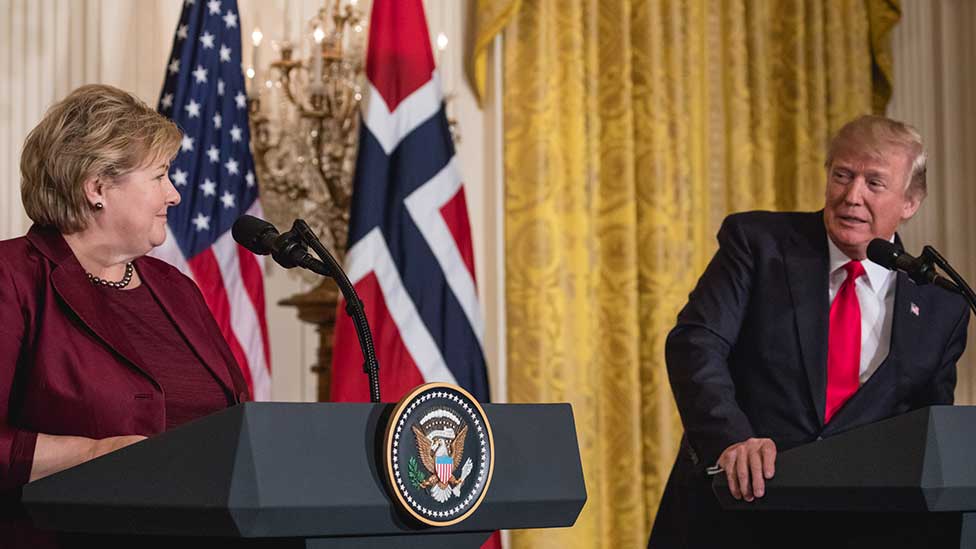
When Prime Minister Erna Solberg met Mr Trump in Washington in 2018 she may have been surprised to be told Norway had bought a fighter jet only available in Call of Duty, a computer game.
A day later Norway was reportedly mentioned by Mr Trump as an example of the sort of country the US should be taking migrants from in a meeting with lawmakers from both parties to propose a bipartisan immigration deal.
Democratic Senator Richard Durbin had just been discussing US temporary residency permits granted to citizens of countries hit by natural disasters, war or epidemics.
Senator Durbin said Mr Trump used "racist" language and called some African nations "shitholes". Mr Trump tweeted that he had used "tough" language but not that specific term.
Responding to Mr Trump, Torbjoern Saetre, a politician in Norway's Conservative Party, tweeted: "On behalf of Norway: Thanks, but no thanks."
Pakistan

"The United States has foolishly given Pakistan more than 33 billion dollars in aid over the last 15 years, and they have given us nothing but lies & deceit, thinking of our leaders as fools."- @realDonaldTrump, 1 Jan 2018
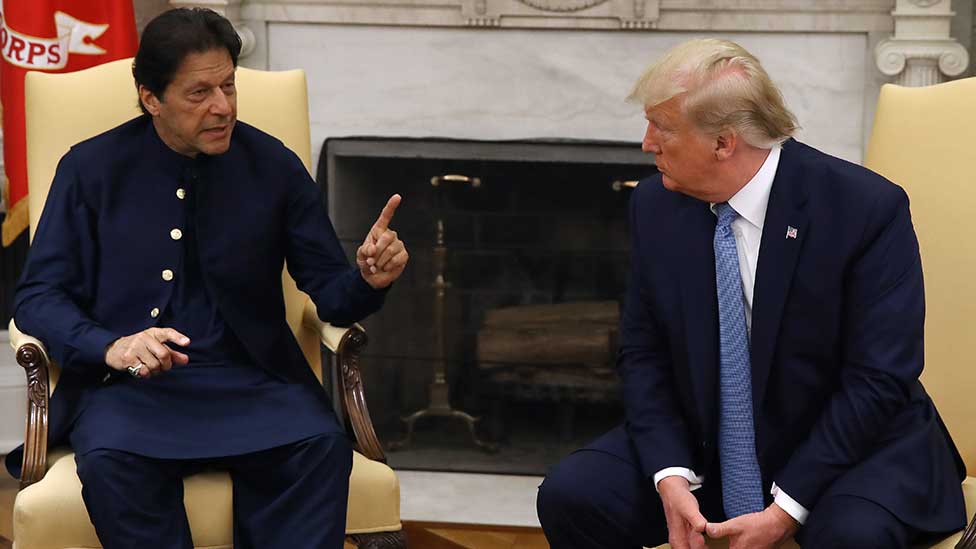
Tensions between the US and its previously close ally have been strained for years, but it was clear that the relationship would become even more strained when President Trump outlined his strategy towards the region in his first year in office.
"We have been paying Pakistan billions and billions of dollars at the same time they are housing the very terrorists that we are fighting. It is time for Pakistan to demonstrate its commitment to civilisation, order and peace," Mr Trump said in a speech in August 2017.
In January 2018, he took to Twitter again to accuse Pakistan of giving "safe haven to the terrorists we hunt in Afghanistan" before adding: "No more!"
Military aid worth $300m (£230m) was eventually cut in September that year, with a Pentagon spokesman saying the US would continue "to press Pakistan to indiscriminately target all terrorist groups".
It was with this as the backdrop that new Pakistani Prime Minister Imran Khan flew to Washington DC to meet President Trump for the first time in July 2019.
There were smiles for the cameras and Mr Trump opened a joint press conference by calling Mr Khan "very popular" and "a great athlete". He once again accused Pakistan of failing to respect the US in recent years but he said the country was "helping us a lot now".
Shortly after their meeting, there was renewed violence in Kashmir between Pakistani and Indian forces. At a meeting with Mr Khan in September during the UN General Assembly, Mr Trump offered to mediate between the two sides, saying: "I think I would be an extremely good arbitrator. I have done it before, believe it or not, and I have never failed as an arbitrator."
The pair met again earlier this year, on the sidelines of the World Economic Forum in Davos in January. Mr Trump said the relationship between the two countries had "never been closer" but admitted he had no plans to visit the country - although he did travel to India the next month.
Palestinian Territories

"We were paying a lot of money to the Palestinians every year and we were not being treated properly. They were not saying nice things for many years."- President Trump, speaking at the White House, 15 Sep 2020
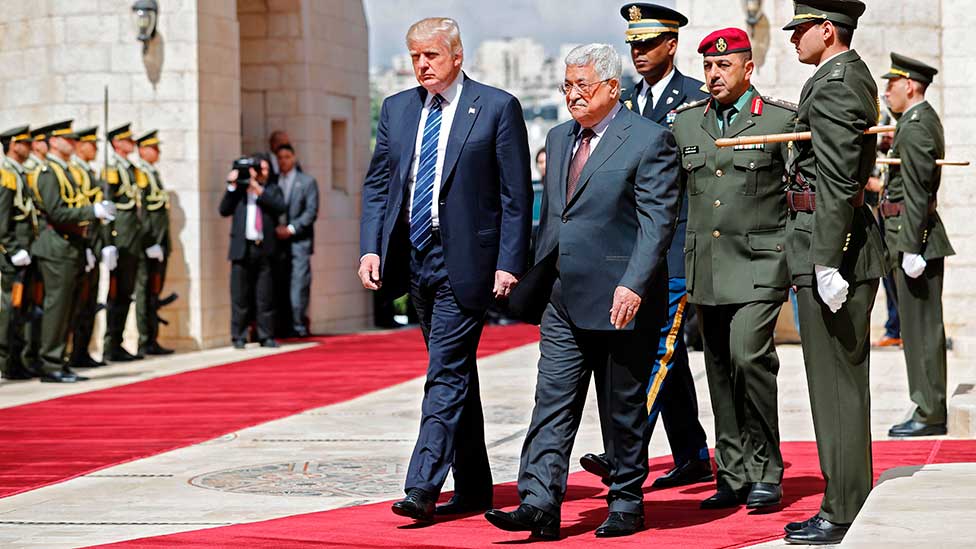
Mr Trump first met President Mahmoud Abbas during the Palestinian leader's White House visit at the beginning of May 2017.
He said there was a "very good chance" of a Middle East peace deal, telling Mr Abbas during a joint news conference: "We will get this done".
During a visit to Bethlehem to meet Mr Abbas again later that month, Mr Trump said he would "do everything" to help Israelis and Palestinians achieve peace.
But Mr Trump's recognition of Jerusalem as Israel's capital in December 2017 led to a sharp deterioration in relations as did his threats to withdraw financial support.
Discussing Mr Trump's plans for Middle East peace in January 2018, Mr Abbas said: "The deal of the century is the slap of the century and we will not accept it."
Later that year, the US ended its funding for the UN's Palestinian refugee agency, describing it a "irredeemably flawed" - a move President Abbas said was an "assault" against his people.
Despite the rift though, Mr Trump's son-in-law and senior adviser, Jared Kushner, told reporters in June 2019 that the president was "very fond" of Mr Abbas, adding: "He likes him very much personally. And at the right time, if they're willing to engage, I believe that they'll find that they'll have an opportunity."
President Trump unveiled the details of his Middle East peace plan in January 2020, which involved recognising Israeli sovereignty over settlements in the West Bank. Mr Abbas rejected the plan and said: "All our rights are not for sale and are not for bargain."
As recently as September, however, President Trump said his plan was still on the table. Talking at a joint press conference with Israeli Prime Minister Benjamin Netanyahu, he said: "We're working on a deal. We're talking to the Palestinians. At the right time, they'll be joining too."
Panama

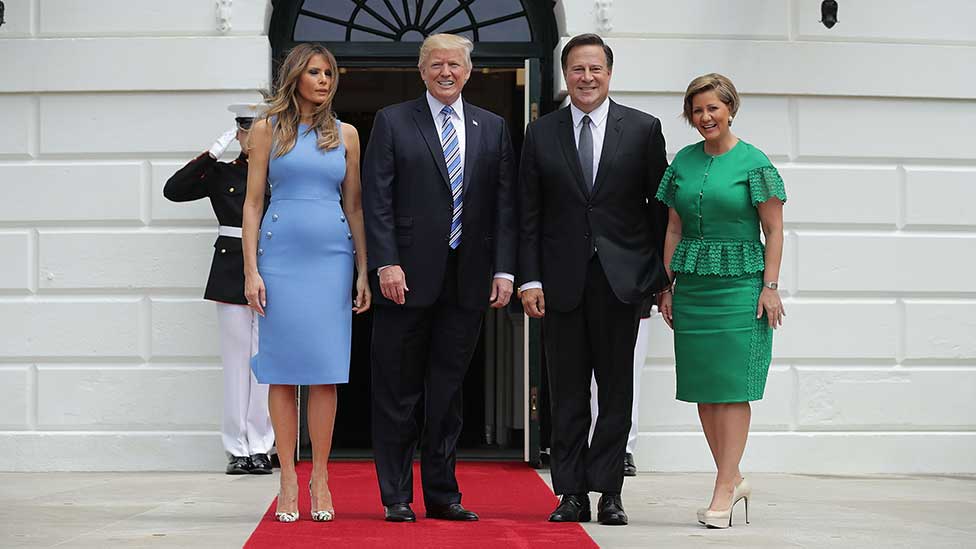
President Trump met President Juan Carlos Varela of Panama in June 2017, discussing illegal immigration, organised crime and drug gangs.
But the most memorable moment from their joint press conference was when Mr Trump appeared to take credit for building the Panama Canal, which was opened by the US in 1914.
"The Panama Canal is doing quite well," the president said at the meeting. "I think we did a good job building it, right?"
"Yeah. One hundred years ago," Mr Varela responded.
Mr Trump also praised US-Panama relations, saying "things are going well" and "the relationship has been very strong".
Mr Varela was replaced by Laurentino Cortizo in 2019. Mr Trump sent a delegation to Mr Cortizo's inauguration, led by Commerce secretary Wilbur Ross.
Mr Cortizo said he spoke to Mr Trump on the phone in May this year, during which the American president offered to help Panama during the coronavirus pandemic.
Peru

"We're interested in the free movement of people. I emphasised that to President Trump and we prefer bridges to walls"- President Kuczynski after a meeting at the White House, 24 Feb 2017
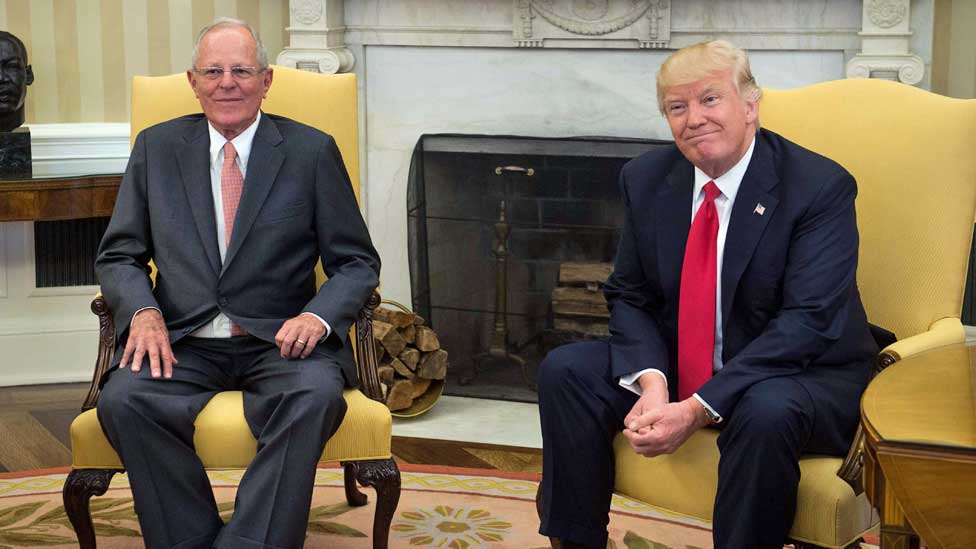
Peruvian President Pedro Pablo Kuczynski had a substantial amount of contact with Mr Trump in his first few months in the White House.
The two men spoke several times over the phone and Mr Kuczynski also visited Washington DC for a meeting with the president.
As well as discussing regional security and trade between the two countries, the Peruvian president was particularly interested in persuading the US to deport its fugitive ex-leader Alejandro Toledo.
Mr Toledo, who is believed to be in San Francisco, is accused of taking $20m (£16m) in bribes. He denies that and says he is the victim of a witch-hunt.
But he was eventually arrested in the US in July 2019 before being released on bail in March this year because of the risk he faced of contracting coronavirus while waiting for trial.
Mr Kuczynski was replaced by Martín Vizcarra in March 2018. Mr Trump was due to meet President Vizcarra at a summit in Peru's capital Lima in April 2018, but he cancelled the trip at short notice to deal with reports of a chemical weapons attack in Syria.
Philippines

"We were having a lot of problems with the Philippines. The relationship with the past administration was horrible, to use a nice word… And now we have a very, very strong relationship with the Philippines."- President Trump, speaking to reporters in Manila - 14 Nov 2017
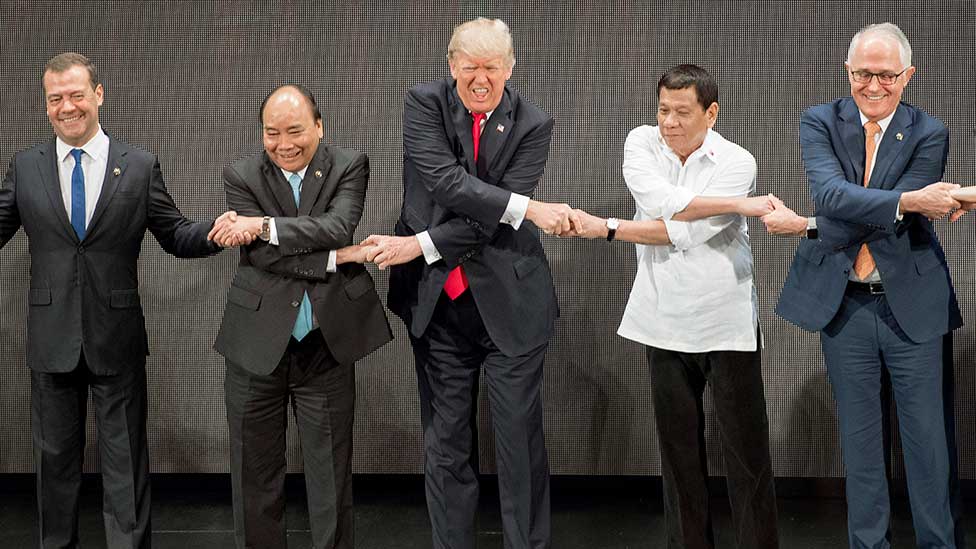
Donald Trump has only had a couple of interactions with President Rodrigo Duterte, but they caused a lot of controversy in the US.
Mr Trump first spoke to Mr Duterte over the phone in April 2017, in what was a "very friendly conversation" in which they discussed "the fact that the Philippine government is fighting very hard to rid its country of drugs, a scourge that affects many countries throughout the world."
Mr Duterte has been widely criticised for human rights violations in the Philippines, after he authorised police and vigilantes to maim and kill drug users on the streets of Manila.
His relationship with the US had been rocky in the past, in part because former President Barack Obama criticised the extrajudicial executions. Mr Obama cancelled a trip to the Philippines in September 2016 after Mr Duterte called him a "son of a whore".
Mr Trump, however, has had a warmer relationship with his Philippine counterpart.
After meeting Mr Duterte during a visit to the Philippines in November 2017, Mr Trump hailed their "great relationship" and their joint statement pledged to "further deepen the extensive United States-Philippine economic relationship".
Mr Trump did invite Mr Duterte to the White House but that meeting has yet to take place.
Earlier this year, Mr Duterte said his American counterpart "is a good president and deserves to be re-elected".
Poland

"America loves Poland, and America loves the Polish people."- Donald Trump, in a speech in Warsaw, 6 Jul 2017
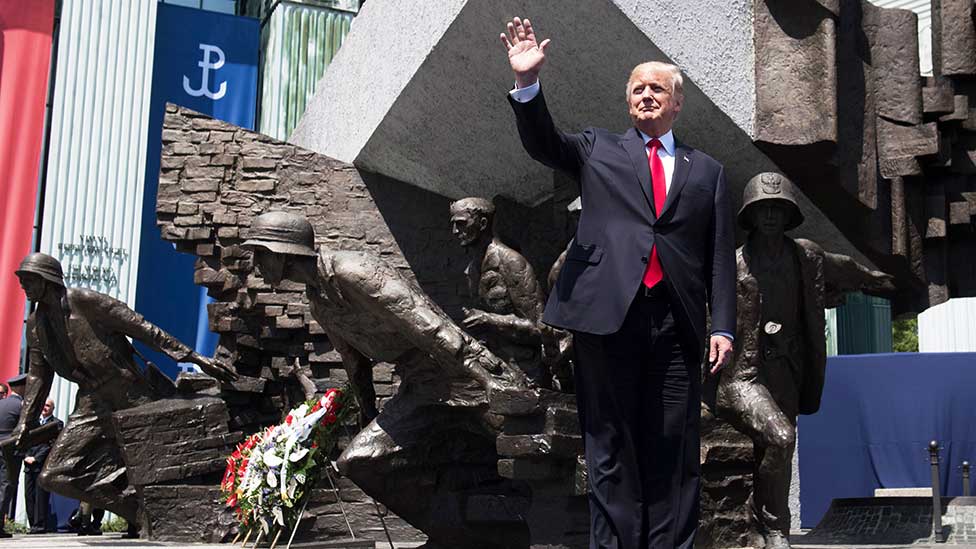
Donald Trump is a big fan of Poland and its people.
During a visit there in July 2017, he described Poland as an example of a country ready to defend Western freedoms, warning against the threats of "terrorism and extremism".
Mr Trump spoke of "the triumph of the Polish spirit over centuries of hardship" as an inspiration "for a future in which good conquers evil, and peace achieves victory over war" during his speech in Warsaw.
He also thanked the country for buying Patriot missile defence systems from the US in a multi-billion dollar contract as well as its investments in the Nato alliance.
"America loves Poland, and America loves the Polish people," he declared.
Polish President Andrzej Duda has visited the White House a couple of times since then, most recently in June 2019, when Mr Trump tweeted: "US-Poland ties are at an all-time high. Thank you for being such an exemplary Ally!"
Mr Trump sent his congratulations to Mr Duda after he was re-elected in July this year. A month later, the US announced it was redeploying about 1,000 American troops from Germany to Poland.
Qatar

"The nation of Qatar unfortunately has historically been a funder of terrorism at a very high level."- President Trump, speaking at the White House, 9 Jun 2017
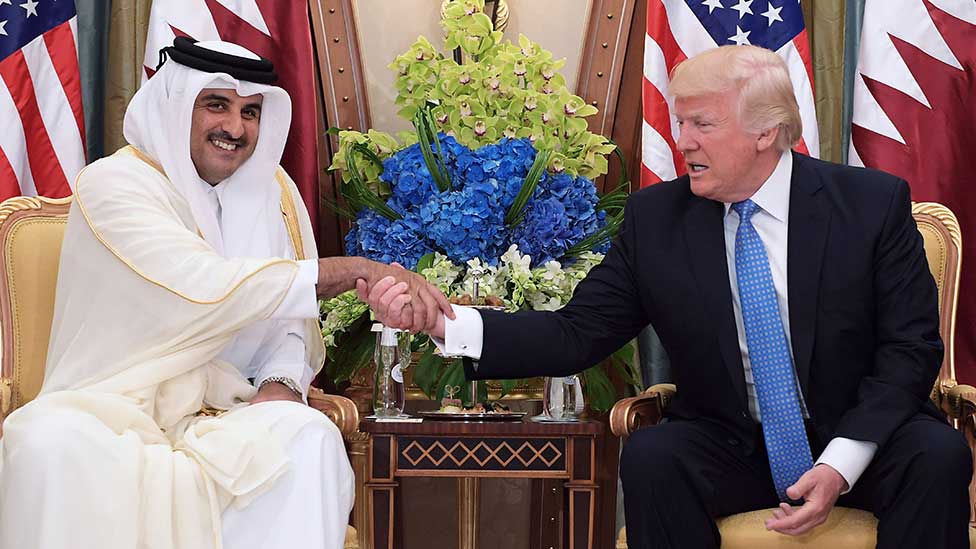
The first phone call with the Qatari emir, Sheikh Tamim bin Hamad al-Thani, came in February 2017 amid an attempted travel ban by Mr Trump that affected several Middle Eastern countries, but not Qatar itself.
The two men are said to have discussed the fight against the so-called Islamic State group, with Qatar being a prominent member of the US-led coalition.
But soon after that, several Gulf countries cut travel and embassy links with Qatar over its alleged support for militants. Qatar strongly denied supporting radical Islamism.
Mr Trump took initial credit for applying pressure on Qatar in the longstanding Arab-world rift, saying it could mark "the beginning of the end to the horror of terrorism".
In June 2017, he again accused Qatar of funding terrorism, tweeting: "During my recent trip to the Middle East I stated that there can no longer be funding of Radical Ideology. Leaders pointed to Qatar – look!"
Barely a year later, however, Mr Trump welcomed Sheikh Tamim to the White House and praised him for becoming a "big advocate" of combating terrorist financing. He also said the emir was a "great gentleman" and a "friend of mine".
They met again in the White House the following year. Mr Trump said Qatar was "creating a lot of jobs" in the US by "buying tremendous amounts of military equipment including planes and they are buying commercial planes... we very much appreciate it".
Russia

"Very good call yesterday with President Putin of Russia. Tremendous potential for a good/great relationship with Russia, despite what you read and see in the Fake News Media."- @realDonaldTrump, 4 May 2019
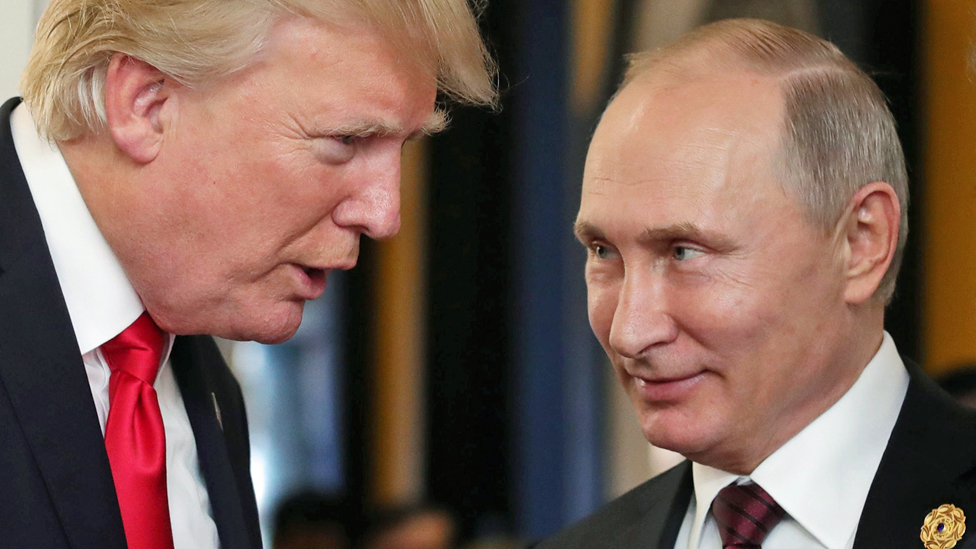
No US relationship has been more closely scrutinised than Donald Trump's ties to Russia.
At a summit with Vladimir Putin in Helsinki in July 2018, Mr Trump defended Russia over claims of interference in the 2016 US election.
He was asked if he believed his own intelligence agencies or the Russian president when it came to allegations of meddling in the election. "President Putin says it's not Russia. I don't see any reason why it would be," he replied.
But a day later, Mr Trump said he had misspoken.
"The sentence should have been: 'I don't see any reason why I wouldn't' or 'why it wouldn't be Russia'. Sort of a double negative," he explained to reporters when he arrived back in the US.
A special counsel was set up in May 2017 to investigate whether there was any collusion between Russia and Mr Trump's team during the election campaign. It eventually concluded that Russia had interfered in the election with the intention of benefitting Mr Trump's campaign but that there was no evidence the campaign conspired with Russia.
Mr Trump has tweeted more about Russia than any other country during his time as president, with the investigation being a big reason why.
His administration has been pretty tough on Russia, punishing it with sanctions. But Mr Trump has also spoken of his desire to improve relations with Russia.
In March 2018, he tweeted: "I called President Putin of Russia to congratulate him on his election victory. The Fake News Media is crazed because they wanted me to excoriate him. They are wrong! Getting along with Russia (and others) is a good thing, not a bad thing…"
Then the following month, he alarmed allies by saying Russia should be readmitted to the G7 group of industrialised nations. Russia was suspended from what was then the G8 after it annexed Crimea from Ukraine in 2014.
In December 2019, President Putin warned that the US now viewed space as "a military theatre" and said Russia needed to develop its own space forces further. But a few weeks later, he thanked Mr Trump for US intelligence that helped foil "acts of terrorism" on Russian soil.
Saudi Arabia

"Saudi Arabia has now agreed to spend the necessary money needed to help rebuild Syria, instead of the United States. See? Isn't it nice when immensely wealthy countries help rebuild their neighbors rather than a Great Country, the US, that is 5000 miles away. Thanks to Saudi A!"- @realDonaldTrump, 24 Dec 2018
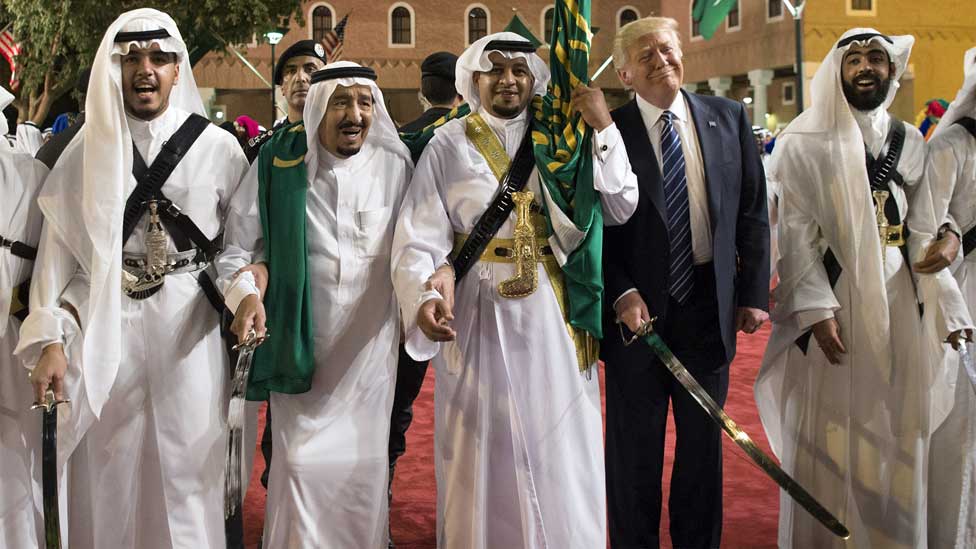
Saudi Arabia has had a close relationship with the US for decades and that has continued under President Trump - despite some issues along the way.
Mr Trump made his first foreign trip as president to meet King Salman bin Abdulaziz Al Saud in Riyadh, where the White House said it signed deals worth more than $350bn (£270bn).
Mr Trump appeared a little out of his comfort zone when he took part in a ceremonial sword dance during the trip.
Relations had soured somewhat under President Obama after his administration's nuclear deal with Iran, but Mr Trump appeared to want to restore the partnership after he sided with Saudi Arabia in a diplomatic standoff with Qatar.
When Saudi Arabia's leaders launched a purge of allegedly corrupt officials last November, Mr Trump tweeted: "I have great confidence in King Salman and the Crown Prince of Saudi Arabia, they know exactly what they are doing... Some of those they are harshly treating have been "milking" their country for years!"
There was some tension when Jamal Khashoggi, a Saudi journalist with US residency, was killed in Turkey in October 2018. President Erdogan of Turkey said it was a "political murder" carried out by Saudi intelligence officers, which Saudi Arabia denied.
Speaking to reporters at the White House, Mr Trump said: "They had a very bad original concept, it was carried out poorly and the cover-up was the worst in the history of cover-ups.
He later said he had spoken to King Salman, whose denial was "very, very strong," before adding: "It sounded to me like maybe these could have been rogue killers. Who knows?"
More recently, Mr Trump called on the king to increase the kingdom's oil production, complaining that the price of a barrel of oil had risen too high. He tweeted his gratitude when the Saudis and Russia agreed on a deal in April.
Singapore

"We are close friends with Singapore and with Prime Minister Lee and we've gotten to know each other very well and we are signing a memorandum of defence and it's a very strong understanding."- President Trump, speaking at the White House, 23 Sep 2019
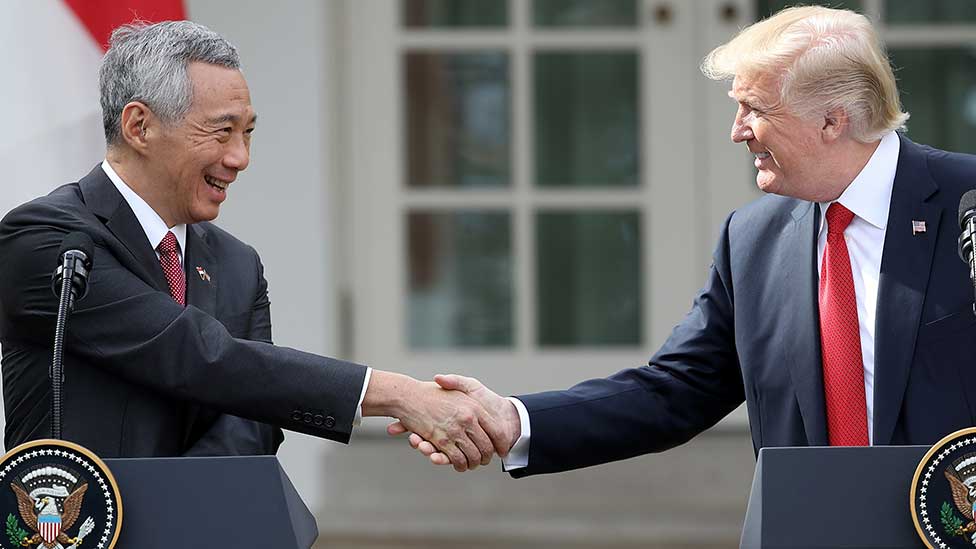
President Trump has met Singapore's Prime Minister Lee Hsien Loong several times during his four years in office.
Their relationship had an awkward moment early on, when the president's social media team posted a photo of the two leaders on Instagram after their first meeting at a G20 summit and mistakenly identified the prime minister as Indonesian President Joko Widodo.
But Mr Lee was welcomed to the White House a few months later during a visit in which Singapore Airlines signed a deal with Boeing for new aircraft worth more than $13.8 billion.
Reacting to the deal, Mr Trump said: "I want to thank the Singaporean people for their faith in the American engineering and American workers."
The two men also signalled the two countries' alliance in 2019 when they renewed a military pact that allows US forces to use Singapore's air and naval bases, extending it to 2035.
Announcing the move, PM Lee said it reflected the "very good cooperation" of the countries on defence but also the broader cooperation "in security, in economics, in counterterrorism, and in culture and education, as well".
Somalia

Somalia felt the effects of the Trump presidency almost immediately, with the country among those whose citizens were banned from entering the US.
The move followed Mr Trump's call in 2015 for "a total and complete shutdown of Muslims entering the United States until our country's representatives can figure out what is going on". His statement came after a mass shooting in California carried out by a radicalised couple.
While the travel ban was initially blocked by court challenges, it was eventually upheld in 2018 by the Supreme Court.
In May 2017, a member of the US military was killed in Somalia, the first confirmed combat death there since the disastrous Black Hawk Down incident in 1993, when more than a dozen US soldiers and hundreds of Somalis were killed. There was another US fatality in June 2018.
The deaths came after the US announced in April 2017 that it was sending dozens of troops to Somalia to train forces fighting Islamist group al-Shabab.
The number of drone strikes carried out by the US military in Somalia has increased a lot under President Trump. But the militant Islamist group has stubbornly resisted the offensive and killed three Americans across the border in Kenya in January this year.
Mr Trump is reported to have recently told his military advisers to draw up plans for the withdrawal of the remaining few hundred US troops still in the country.
Ilhan Omar, a Democratic congresswoman in Minnesota who was born in Somalia, has found herself a focal point for much of President Trump's recent anti-immigration rhetoric.
Talking about her at a campaign rally in Oklahoma in June, he said: "She would like to make the government of our country just like the country from where she came - Somalia. No government, no safety, no police, no nothing, just anarchy. And now, she's telling us how to run our country. No, thank you."
South Africa

Donald Trump the businessman didn't have much positive to say about South Africa, tweeting that the country was a "mess" back in 2015.
He took a slightly different approach as president though, telling President Jacob Zuma that he hoped to "expand cooperation and trade" between the two countries.
Mr Trump held a working lunch for African leaders, including Mr Zuma, in New York in September 2017. During the meeting, Mr Trump said: "Africa has tremendous business potential. I have so many friends going to your countries, trying to get rich."
Mr Zuma was replaced as president in February 2018 by Cyril Ramaphosa.
President Trump caused some controversy in the country a few months later when he tweeted that he had asked Secretary of State Mike Pompeo to "closely study the South Africa land and farm seizures and expropriations and the large scale killing of farmers."
His tweet followed a piece on Fox News about South Africa's planned land reforms but a spokesman for Mr Ramaphosa said the American president was "misinformed".
President Trump and Mr Ramaphosa spoke by phone earlier this year amid a growing outbreak of coronavirus in the US, with the South African leader saying he had "passed our condolences to the Government and people of the US on the devastation the virus has wrought".
South Korea

"We're doing a tremendous service. We have a wonderful feeling and a wonderful relationship with each other, but we have to be treated equitably and fairly."- President Trump, talking to reporters at the White House, 20 Apr 2020
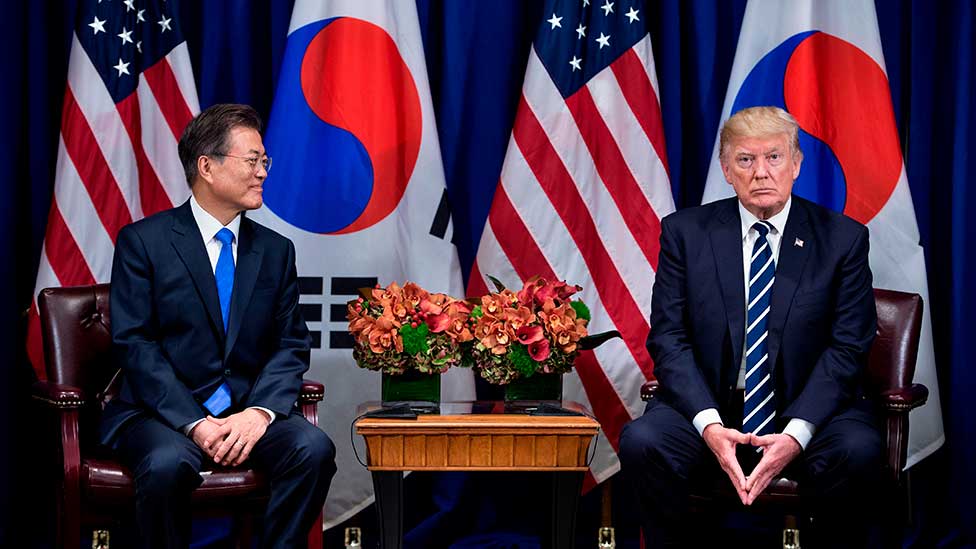
President Trump's tough rhetoric towards North Korea had many in the South feeling worried for much of 2017. But there was hope that tensions on the peninsula had been diffused when the US president brought North Korean leader Kim Jong-un to the negotiating table.
After South Korean President Moon Jae-in's historic meeting with Mr Kim in April 2018, Mr Trump tweeted: "After a furious year of missile launches and Nuclear testing, a historic meeting between North and South Korea is now taking place. Good things are happening, but only time will tell!"
Mr Moon, for his part, said Mr Trump "deserves big credit" for getting North Korea to agree to talks.
Trade has also been a key part of the two countries' relationship during Mr Trump's term.
The American president had long wanted to renegotiate the "horrible" free trade agreement the US struck with South Korea in 2012, claiming it had "destroyed" the US.
In September 2018, the two sides signed a revised trade pact that, among other things, allows US carmakers greater access to the South Korean market while protecting Seoul from some of the tariffs that the US had introduced on steel. Mr Trump hailed it as a "a very big deal".
There have been several moments of tension in the relationship, however. A frequent complaint of Mr Trump's has been that South Korea should pay the US more for its military support.
In March 2019, he tweeted that military drills between the countries had been cancelled "to save hundreds of millions of dollars for the U.S. for which we are not reimbursed".
Later that year, he confirmed South Korea had started talks over increasing their payments to the US, saying: "South Korea is a very wealthy nation that now feels an obligation to contribute to the military defence provided by the United States of America."
But in April this year, he said he had rejected an offer from Seoul, telling reporters: "We're asking them to pay for a big percentage of what we're doing. It's not fair... It's a question of will they contribute toward the defence of their own nation."
Spain

"Our relationship has been outstanding over the years and, I think, especially right now. Excellent trade relationship, military relationship. Just about everything you can have. So we love Spain."- President Trump, speaking at the White House, 19 Jun 2018
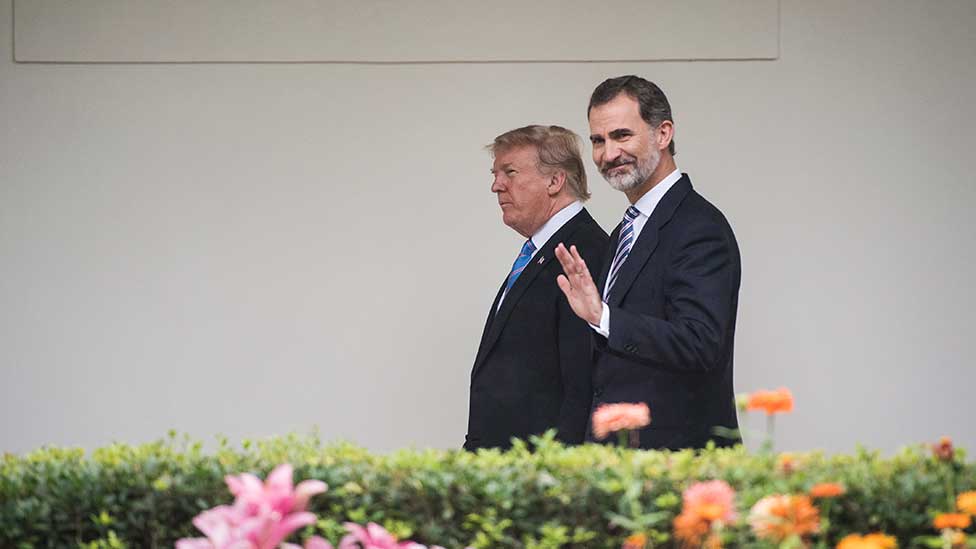
Donald Trump has enjoyed relatively warm relations with Spain's leaders.
At a meeting with Prime Minister Mariano Rajoy in June 2017, Mr Trump said he thought Spain was "a great country" and that he hoped it would remain "united" despite a push from people in the Catalonia region for independence.
Mr Rajoy was ousted by a vote of no confidence in June 2018 and replaced by Pedro Sánchez, who President Trump has met at Nato and G7 summits but not at the White House.
Mr Trump and his wife Melania have, however, welcomed Spain's King Felipe VI and Queen Letizia to the White House, celebrating "over 300 years of historic and cultural ties between our two great countries" at a meeting in June 2018.
The American president had been due to host the Spanish royals for a second time in April this year, but it was postponed due to the coronavirus pandemic. It would have been only the third state visit under Mr Trump - the other two were by the French and Australian leaders.
In 2018, Mr Trump reportedly suggested to Spain's foreign minister that Europe should build a wall across the Sahara, similar to the one on the US-Mexico border, to solve the migrant crisis.
In recent months, Mr Trump has mentioned Spain frequently when trying to suggest that Europe has had much bigger problems dealing with coronavirus compared to the US. Speaking at the White House in June, he said: "Look what happened to Spain… It's just been shattered."
But both countries have been hit hard by the virus, with the death rate in Spain only slightly higher than in the US.
Sudan

"GREAT news! New government of Sudan, which is making great progress, agreed to pay $335 MILLION to U.S. terror victims and families. Once deposited, I will lift Sudan from the State Sponsors of Terrorism list. At long last, JUSTICE for the American people and BIG step for Sudan!"- @realdonaldtrump, 19 Oct 2020
Sudan is another of the predominantly Muslim countries that Donald Trump included on his initial travel ban list.
The Supreme Court partly reinstated the ban after it was twice rejected by judges in the US, but by that point Sudan had been removed from the list reportedly due to improved cooperation.
However, the country was added once again in early 2020, meaning Sudanese nationals can no longer apply for "diversity visas", which are available by lottery for applicants from countries with low rates of immigration to the US.
In better news for the relationship of the two countries, Mr Trump has recently signalled his intention to remove Sudan from a US list of state sponsors of terror, meaning sanctions dating back to the 1990s could be removed.
In another sign of the improving relations since Sudanese President Omar al-Bashir was ousted in 2019, Mr Trump also recently announced that the country was normalising its relations with Israel, saying it was a "HUGE win today for the United States and for peace in the world".
Sudanese Prime Minister Abdalla Hamdok said the move was part of the new government's efforts in working "towards international relations that best serve our people".
Sweden

"Give the public a break - The FAKE NEWS media is trying to say that large scale immigration in Sweden is working out just beautifully. NOT!"- @realDonaldTrump, 20 Feb 2017
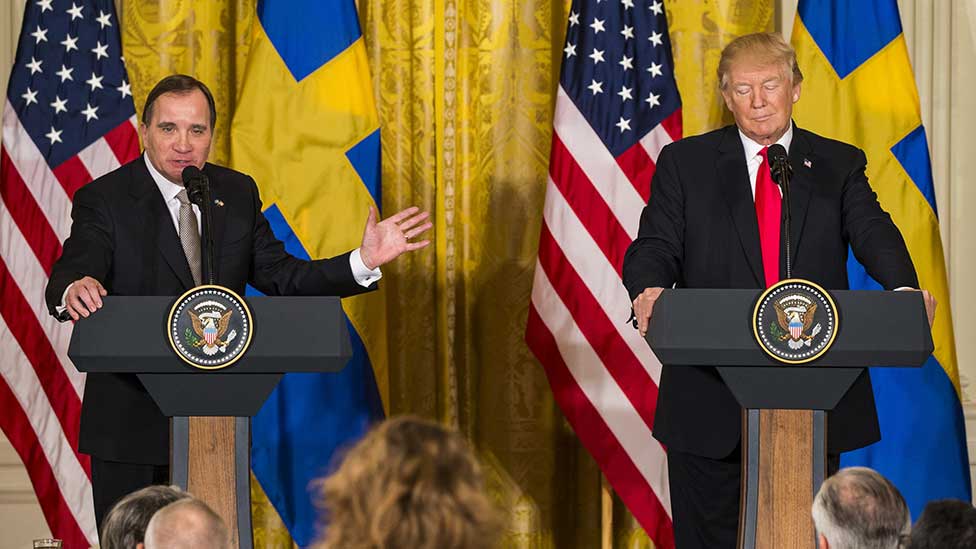
President Trump caused a bit of a stir in Sweden early on in his presidency.
"Look at what's happening last night in Sweden. Sweden, who would believe this. Sweden. They took in large numbers of migrants]. They're having problems like they never thought possible," the president [told a crowd in Florida.
The only problem was that no-one seemed to know what incident he was referring to - not least lots of baffled Swedes.
Mr Trump later said he had been referring to a Fox News report on gun violence and rape in Sweden since it opened its doors to large numbers of asylum-seekers in 2013 - but the police officers interviewed said their comments had been taken out of context and data didn't appear to back up claims that there had been a surge in gun crimes or rape.
The president raised eyebrows again in 2019, when he took to Twitter to call for the release of American rapper A$AP Rocky, who had been charged with assault in Stockholm.
"Give A$AP Rocky his FREEDOM. We do so much for Sweden but it doesn't seem to work the other way around. Sweden should focus on its real crime problem!" the president tweeted in July 2019. "Very disappointed in Prime Minister Stefan Löfven for being unable to act," he added.
The rapper was eventually found guilty and given a suspended sentence, but he had returned to the US by that point.
In recent months, Mr Trump has mentioned Sweden frequently when talking about the coronavirus pandemic, tweeting in April that the country was "paying heavily for its decision not to lockdown". Sweden's foreign minister, however, has called Mr Trump's assessments "factually wrong".
Despite the bumps, Mr Löfven insisted during a visit to the White House in 2018 that the two countries had a good relationship despite some differences because they shared the same values. Mr Trump told reporters: "Sweden is a great country. It's small, but it's very sharp, I will tell you. They are very sharp."
Syria

"If anybody but Donald Trump did what I did in Syria... they would be a national hero."- @realDonaldTrump, 31 Dec 2018
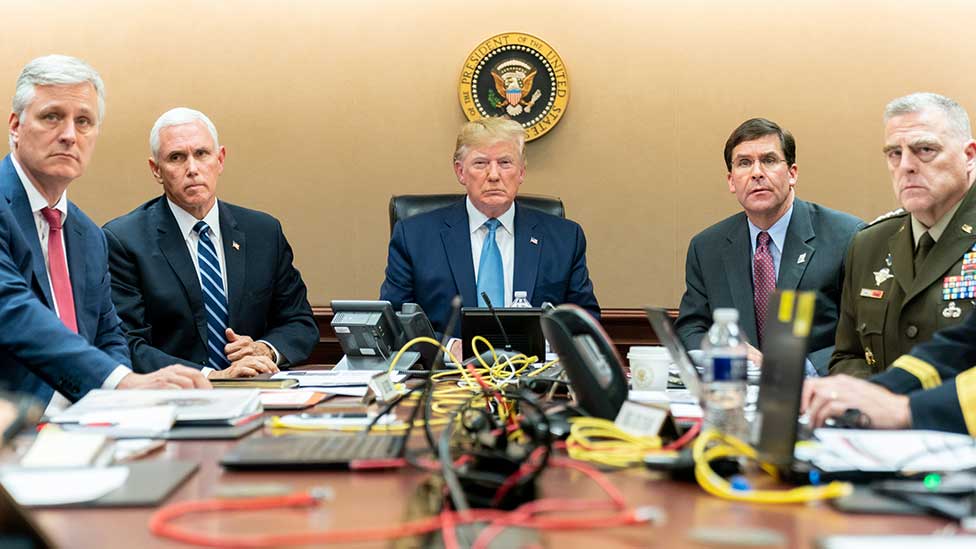
Donald Trump has been a vocal critic of military intervention - particularly in Syria - for some time.
When his predecessor was considering military action in the country back in 2013, Mr Trump tweeted: "Again, to our very foolish leader, do not attack Syria - if you do many very bad things will happen & from that fight the US gets nothing."
But just over two months into his term, President Trump said he was so moved by images of children in the aftermath of a chemical attack by Syrian forces that he was taking military action.
"Using a deadly nerve agent, Syrian President] Assad choked out the lives of helpless men, women and children," Mr Trump [said. "No child of God should ever suffer such horror."
Two US Navy ships fired 59 Tomahawk cruise missiles at a Syrian air base from their positions in the Mediterranean in April 2017. It was the first direct US military action against Mr Assad.
Mr Trump deployed his military again in April 2018, with 100 missiles targeting suspected government chemical weapons facilities in response to another chemical attack.
After the strikes, Mr Trump tweeted: "A perfectly executed strike last night. Thank you to France and the United Kingdom for their wisdom and the power of their fine Military. Could not have had a better result. Mission Accomplished!"
At the end of 2018, Mr Trump made the surprise announcement that US troops would be leaving Syria, saying they had achieved his objective of defeating the so-called Islamic State group (IS). But even allies criticised the move and the withdrawal failed to materialise.
US troops did begin withdrawing from northern Syria in 2019, however, leaving their Kurdish allies to face a Turkish offensive in the region.
Senator Lindsey Graham, a close ally of Mr Trump's, was one of many Republicans to voice their anger at the move, tweeting in October: "Pray for our Kurdish allies who have been shamelessly abandoned by the Trump Administration."
President Trump rejected the criticism and said Turkey and the Kurdish people had been "fighting each other for 200 years". He was involved with securing a ceasefire in the region though, saying that the "Kurds are safe and have worked very nicely with us."
Later that month, Mr Trump announced that IS leader Abu Bakr al-Baghdadi had killed himself during a US military operation in Syria, saying he had been "violently eliminated" and "died like a coward".
Thailand

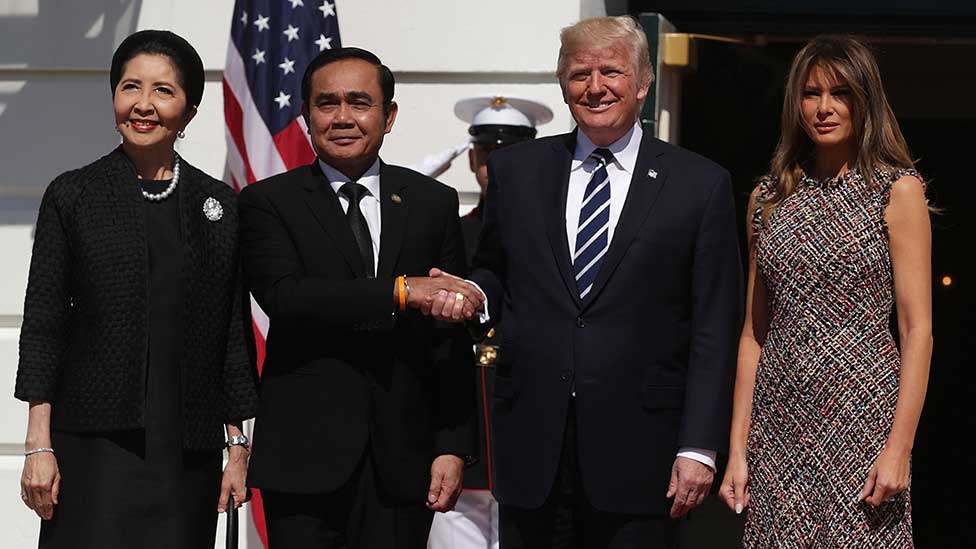
President Trump moved quickly to establish a good relationship with Thailand's Prime Minister Prayut Chan-ocha, who took control of the country in a 2014 coup.
The pair "expressed a strong shared interest in strengthening the trade and economic ties between the two countries" during a call in April 2017.
Thailand's relationship with the US had been somewhat strained in the past because of human rights complaints. Former President Barack Obama did not invite Mr Chan-ocha to visit Washington.
During their phone call, President Trump invited Mr Chan-ocha to visit the White House for the first time, a trip that took place in October 2017.
Talking to reporters with Mr Chan-ocha alongside him, Mr Trump said: "We have a very strong relationship right now, as of this moment, and it's getting stronger in the last nine months."
More recently, Mr Trump caused a stir in Thailand when he mispronounced Thailand as "thigh-land" at a campaign rally in Ohio.
Trinidad and Tobago

Perhaps the unlikeliest country to have made our list, Trinidad and Tobago Prime Minister Keith Rowley spoke to Donald Trump on the phone in February 2017 to discuss "shared priorities".
One of those priorities is terrorism, with some US officials worried that the small Caribbean island could become a "breeding ground for extremists", according to the New York Times.
The island's former US ambassador John Estrada told the newspaper that more than 100 people had travelled from there to fight with the so-called Islamic State group in Iraq and Syria.
Tunisia

When Donald Trump announced a ban on people entering the US from several predominantly Muslim countries, some analysts were surprised not to see Tunisia on the list.
The Arab Spring began there in 2010, but it became a breeding ground for the so-called Islamic State group (IS) - more Tunisians joined them to fight in Iraq and Syria than any other nationality.
President Trump appeared to have decided that a close relationship with Tunisian President Beji Caid Essebsi was important in the fight against IS and he praised the country's "stability and security" in a phone call with its leader in February 2017.
When Mr Essebsi died at the age of 92 in July 2019, a White House statement praised him for being a "tireless advocate for the Tunisian people".
Turkey

"I had a very good conversation with President Erdogan. I respect him. We have a very good relationship. Yes, I agree, he's a tough guy. But we have a very good relationship. I seem to do better with tough people."- President Trump, speaking to reporters at Joint Base Andrews, 18 Feb 2020
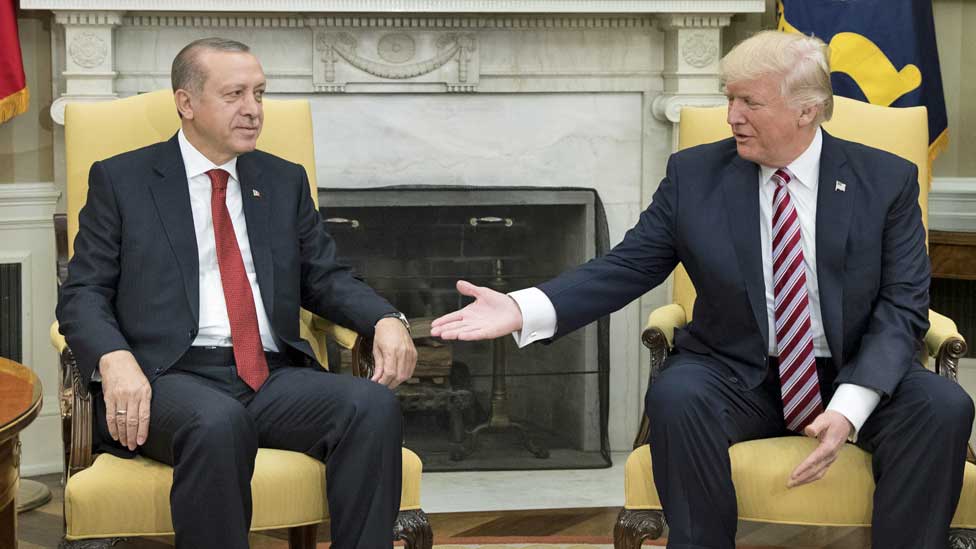
Donald Trump's relationship with Turkey's President Recep Tayyip Erdogan has had a lot of ups and downs over the past four years.
Relations were strained initially by Mr Trump's decision to arm the Syrian Kurds in the battle against the so-called Islamic State group (IS). Turkey views the YPG (Popular Protection Units) as a terrorist group linked to the PKK, a Kurdish separatist group.
But the pair were united at the United Nations General Assembly in September 2017, where they reaffirmed their rejection of a planned Kurdistan referendum.
In 2018, however, there were tensions over the case of an American pastor who had been arrested and charged in Turkey over alleged links to political groups.
Taking to Twitter to protest, Mr Trump accused Turkey of having "taken advantage of the United States for many years" and said the US would be "cutting back on Turkey!"
In another tweet around the same time, Mr Trump announced increased tariffs on the country and said: "Our relations with Turkey are not good at this time!"
Two months later, the pastor was released and President Trump said that while there was no deal made, there was "great appreciation on behalf of the United States, which will lead to good, perhaps great, relations between the United States & Turkey!"
In 2019, Mr Trump's decision to withdraw troops from northern Syria and allow Turkish forces to launch an offensive on Kurdish forces was criticised heavily both at home and abroad.
In response, he tweeted a threat to Turkey: "As I have stated strongly before, and just to reiterate, if Turkey does anything that I, in my great and unmatched wisdom, consider to be off limits, I will totally destroy and obliterate the Economy of Turkey (I've done before!)"
Mr Trump sent Mr Erdogan a letter at the time, telling him: "Don't be a tough guy. Don't be a fool!" But the Turkish leader was reported to have "thoroughly rejected it and put it in the bin".
A fortnight later, President Trump lifted sanctions on Turkey after it agreed to a ceasefire in Syria.
Earlier this year, Mr Erdogan suggested relations may be improving between the two countries, saying after a phone call with his American counterpart: "To be honest, after our conversation tonight, a new era can begin between the United States and Turkey."
Ukraine

"Crimea was TAKEN by Russia during the Obama Administration. Was Obama too soft on Russia?"- @realDonaldTrump, 15 Feb 2017
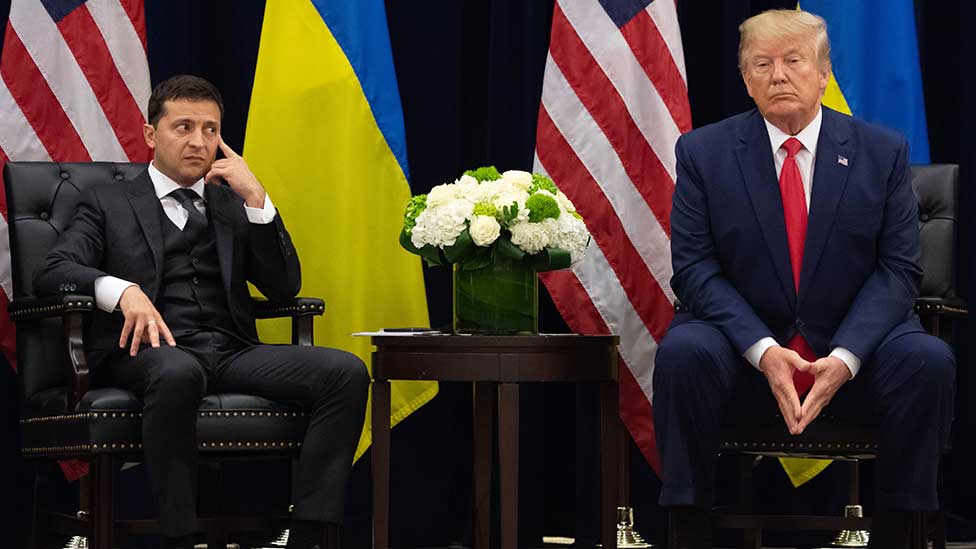
Ukraine was at the centre of the Democrats' bid to impeach President Trump so relations between the two countries have been under the spotlight in the last four years.
Mr Trump has repeatedly accused Barack Obama of having been weak on Russia and allowing them to "pick off" the Crimean peninsula from Ukraine - the kind of rhetoric that will have pleased Kyiv.
But early on in his presidency, the American also called for better ties to Russia, which will have worried Ukrainian authorities.
In June 2017, Mr Trump said he had "very, very good discussions" with President Petro Poroshenko during a visit to the White House by the Ukrainian.
The pair discussed "support for the peaceful resolution to the conflict in eastern Ukraine", where government forces have been fighting Russian-backed rebels since 2014.
The following month, Mr Trump called on Russia to stop "destabilising" Ukraine and "join the community of responsible nations". The Kremlin brushed off the comments.
Mr Poroshenko was replaced by Volodymyr Zelensky in May 2019 and his name became well known in the US later in the year when a phone call he had with Mr Trump became a key part of impeachment proceedings against the American president.
Democrats accused Mr Trump of trying to pressure Mr Zelensky into investigating unsubstantiated corruption allegations against Joe Biden, who would later become his opponent in the 2020 president election.
For his part, Mr Zelensky said there was "no blackmail" in the phone call with President Trump, adding: "This is not corruption, it was just a call." In response, Mr Trump tweeted: "This should immediately end the talk of impeachment!"
Mr Trump was eventually impeached at the end of 2019 but found not guilty after a vote in the Senate in February 2020.
United Arab Emirates

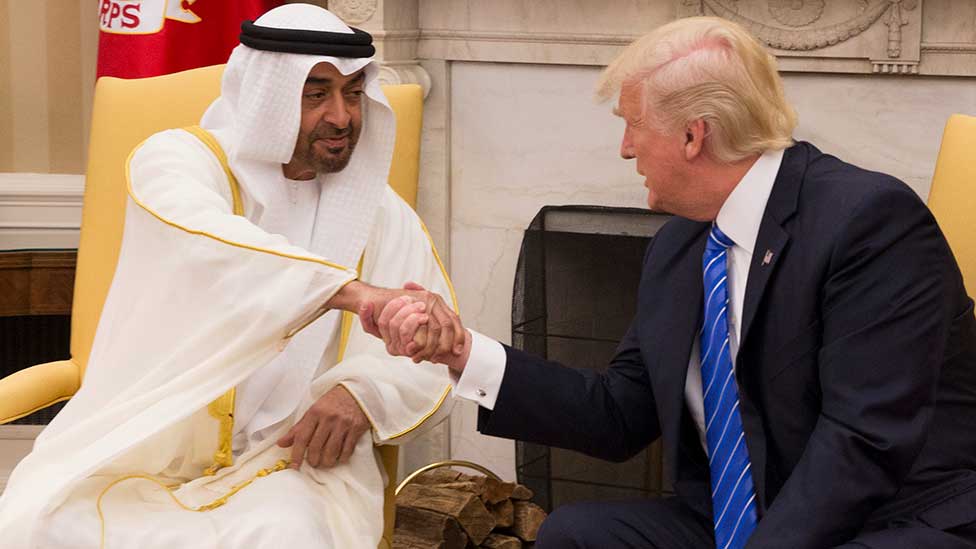
The Crown Prince Sheikh Mohammed bin Zayed Al Nahyan spoke to Donald Trump on the phone just a few days after the former businessman became the new US president.
The two leaders discussed the fight against international terrorism and "committed to further strengthen cooperation on fighting radical Islamic terrorism".
The UAE was not one of the Middle Eastern countries from which Mr Trump tried to ban travel to the US in 2017 and the state's foreign minister was one of the few officials in the region to defend the move.
Sheikh Abdullah Bin Zayed Al Nahyan described Mr Trump's proposed ban as a "sovereign decision" and said some of the countries on the list "face structural problems" that need to be dealt with.
The strength of the relationship was on show recently, when President Trump announced that his administration had overseen a deal with the UAE and Israel that will see the Arab state normalise relations with its historic foe.
"After decades of division and conflict we mark the dawn of a new Middle East," Mr Trump told a crowd of hundreds gathered at the White House in September this year as he celebrated both the UAE deal with Israel and a similar one with Bahrain.
United Kingdom

"Congratulations to Boris Johnson on his great WIN! Britain and the United States will now be free to strike a massive new Trade Deal after BREXIT."- @realdonaldtrump, 13 Dec 2019
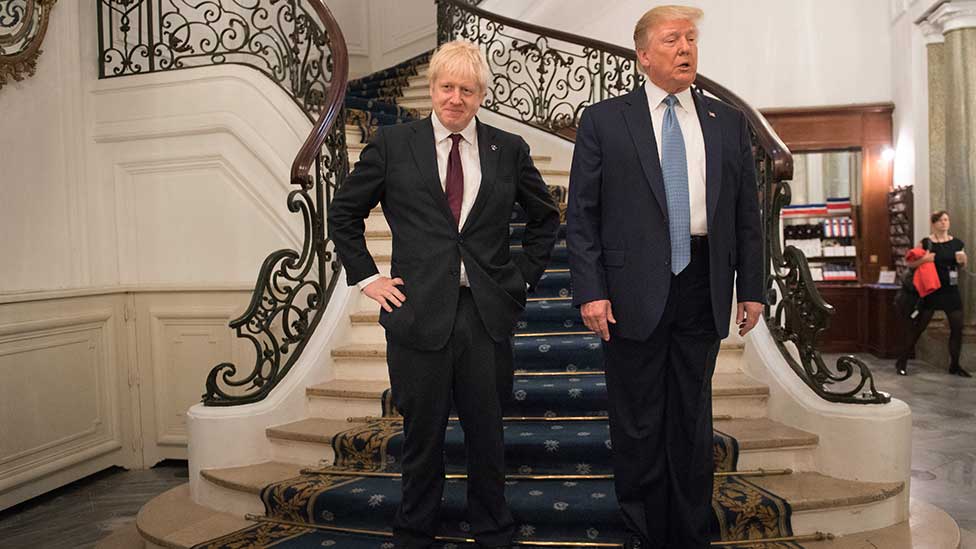
President Trump had a slightly bumpy relationship with Theresa May, the first British prime minister he had to deal with in his presidency.
He arrived for his first visit to the UK as president on 12 July 2018 but it was immediately overshadowed by the publication of an interview the US president gave to The Sun newspaper.
In it, he said the UK would "probably not" get a trade deal with the US if the prime minister's Brexit plan went ahead.
"If they do a deal like that, we would be dealing with the European Union instead of dealing with the UK, so it will probably kill the deal," he told the paper, adding that Mrs May's plan "will definitely affect trade with the United States, unfortunately in a negative way."
But at a joint news conference on the second day of his visit, he changed his tone and said a trade deal "will absolutely be possible" after the UK leaves the EU. He also said Brexit was an "incredible opportunity".
Mr Trump also met the Queen, although there was no open carriage ride with her through the streets of the capital as the trip was designated a "working visit" rather than an official state visit.
Asked about the protests that greeted his arrival in the UK, he insisted many people were "delighted" he was visiting, adding: "I get thousands of notifications from people in the UK that they love the president of the United States."
But when he arrived in London for a state visit the following year, he was welcomed by further protests and a giant balloon depicting him as a baby.
This time around, the president was given the honour of a state banquet at Buckingham Palace with the Queen, during which he praised the "eternal friendship" between the UK and US.
But earlier in the day, he had called London Mayor Sadiq Khan - who had said the UK should "not roll out the red carpet" for Mr Trump - a "stone cold loser".
A few weeks later, Mr Trump also laid into Mrs May and her proposed Brexit deal, tweeting: "What a mess she and her representatives have created. I told her how it should be done, but she decided to go another way."
So it was little surprise when Mr Trump appeared excited to congratulate Boris Johnson on becoming the new prime minister in July 2019, saying: "He will be great!"
When asked what advice he would give to Mr Johnson on Brexit, the president replied: "He needs no advice. He's the right man for the job. I've been saying that for a long time."
While the pair have enjoyed warm personal relations, there have been some differences on policy, most notably on China, the Iran nuclear deal and the future of Nato.
But after this year, they now have another thing in common - they both got and recovered from coronavirus. When Mr Johnson left intensive care back in April, Mr Trump said it was "great news" and after he returned to the White House to recover from the virus in October, he thanked the British PM for "his friendship and support".
Uzbekistan

Mr Trump spoke to Uzbekistan's President Shavkat Mirziyoyev in December 2017 to discuss "discuss regional security and to explore opportunities for improved cooperation."
That came after Mr Mirziyoyev told Mr Trump his country was ready to "use all forces and resources" to help investigate the New York truck attack, in which eight people were killed. The suspect arrested by police was an Uzbek immigrant.
The two leaders met for the first time in May at the White House, with Mr Trump saying the two countries were "working together from the standpoint of the military".
Venezuela

"My Admin has always stood on the side of FREEDOM and LIBERTY and against the oppressive Maduro regime!"- @realdonaldtrump, 22 Jun 2020
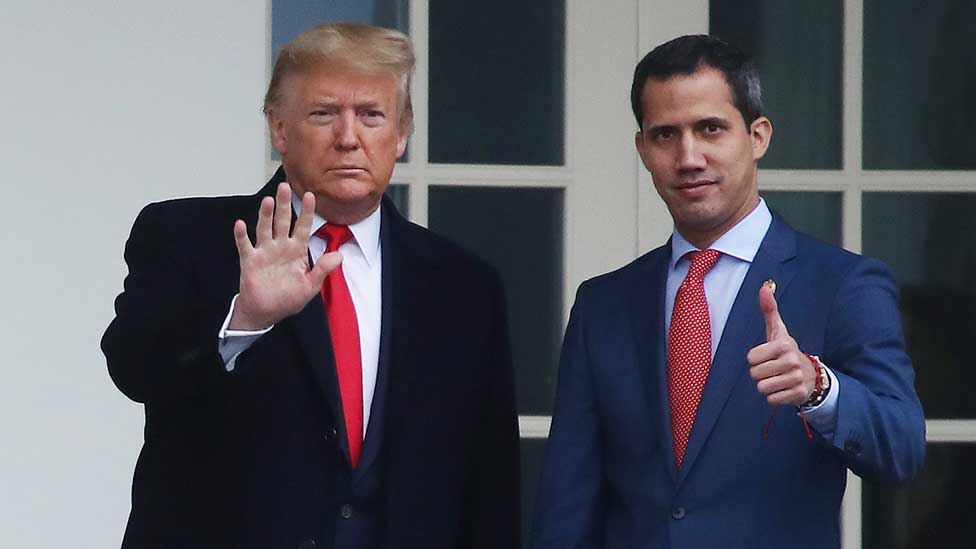
Venezuela has suffered from economic and political crises for several years now and it is deeply divided between those who support the government of the socialist President Nicolás Maduro and those who blame him for the country's dire state.
Mr Trump has discussed the situation in Venezuela with leaders of several neighbouring countries, including Brazil and Colombia, but he has not spoken directly to President Maduro.
In a tweet in October 2017, Mr Trump called "for the full restoration of democracy and political freedoms in Venezuela".
President Maduro, however, sent a word of warning to Mr Trump, saying in a televised speech: "Don't repeat the errors of Obama and Bush when it comes to Venezuela and Latin America."
Mr Maduro was reelected in 2018 but the election was widely dismissed as rigged. After months of a political crisis, opposition leader Juan Guaidó labelled Mr Maduro a "usurper" and declared himself interim president in January 2019.
Shortly afterwards, Mr Trump tweeted: "The citizens of Venezuela have suffered for too long at the hands of the illegitimate Maduro regime. Today, I have officially recognized the President of the Venezuelan National Assembly, Juan Guaidó, as the Interim President of Venezuela."
The following month Mr Trump said: "I ask every member of the Maduro regime: End this nightmare of poverty, hunger and death. LET YOUR PEOPLE GO. Set your country free!"
Dozens of countries around the world have recognised Mr Guaidó as president but the Venezuelan military has remained loyal to Mr Maduro.
Earlier this year, President Trump suggested he would be open to meeting Mr Maduro, telling Axios: "I would maybe think about that... Maduro would like to meet." But he later clarified his position, tweeting: "I would only meet with Maduro to discuss one thing: a peaceful exit from power!"
Vietnam

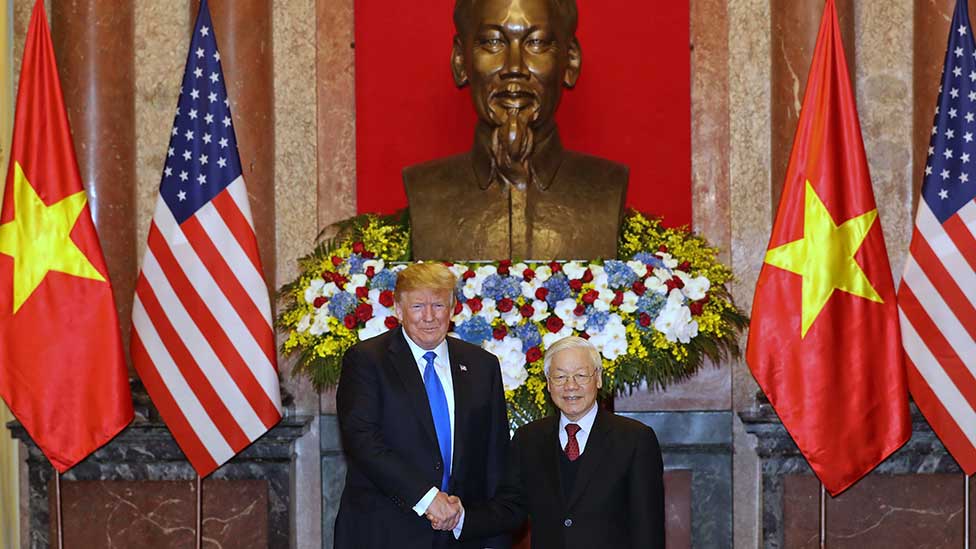
Vietnam played host to President Trump with a lavish two-day state visit around the Asia Pacific Economic Cooperation (APEC) Leaders' Meeting in November 2017.
Mr Trump tweeted his thanks for "a wonderful visit" and was keen to highlight a $12bn (£9bn) purchase of Boeing aircraft in a joint statement after the visit.
A little over a year later, Mr Trump was back in Hanoi to hold a summit with North Korean leader Kim Jong-un. But talks ended without agreement after the US refused North Korean demands for sanctions relief. "Sometimes you have to walk and this was one of those times," Mr Trump said afterwards.
After the talks, Mr Trump tweeted: "THANK YOU to our generous hosts in Hanoi this week: President Trong, Prime Minister Phuc, and the wonderful people of Vietnam!"
Yemen

"[Navy Seal] Ryan died on a winning mission (according to General Mattis), not a "failure". Time for the US to get smart and start winning again!"- @realDonaldTrump, 9 Feb 2017
President Trump's first action on Yemen was to ban its citizens from travelling to America.
While the travel ban was initially blocked by court challenges, it was eventually upheld in 2018 by the Supreme Court.
Yemen has been in the midst of conflict since 2014 and what began as a civil war has grown into a battle between regional powers. One of those most involved is Saudi Arabia, which has been a close ally to President Trump.
In late 2018, Mr Trump called on Saudi Arabia to "allow food, fuel, water, and medicine to reach the Yemeni people who desperately need it". That request followed a vote in the US Senate, which sought to withdraw American support for the Saudi-led coalition fighting in Yemen.
President Trump, however, vetoed the bill passed by Congress in April 2019 and three months later used his veto power again to dismiss similar resolutions that blocked the sale of $8.1bn (£6.5bn) worth of weapons to Saudi Arabia and the United Arab Emirates.
Yemen was the site of the first military operation authorised by Mr Trump in February 2017, in which a special forces team raided the compound of a suspected terrorist leader.
The mission didn't go to plan. The US Navy Seals came under fire from fighters belonging to the al-Qaeda in the Arabian Peninsula group (AQAP) and one member of the elite team was killed.
It later emerged that a number of civilians were also killed in the operation, which had been drawn up in November 2016 but approved by Mr Trump.
In an interview with Fox News, Mr Trump appeared to lay blame for the death of Navy Seal William "Ryan" Owens on military leaders.
"This was a mission that was started before I got here," Mr Trump said. "They came to see me and they explained what they wanted to do, the generals, who are very respected... And they lost Ryan."
In February 2020, a less controversial US operation in Yemen killed the AQAP leader, who had been linked to a series of attacks on Western interests in the 2000s.


Written and produced by Mike Hills. Design by Gerry Fletcher. Development by Becky Rush, Alex Nicolaides, Catriona Morrison and Adam Allen.

How do US presidential elections work?: All you need to know
Four years of President Trump: A look back at his time in office on BBC iPlayer (UK only)

- Published3 November 2020
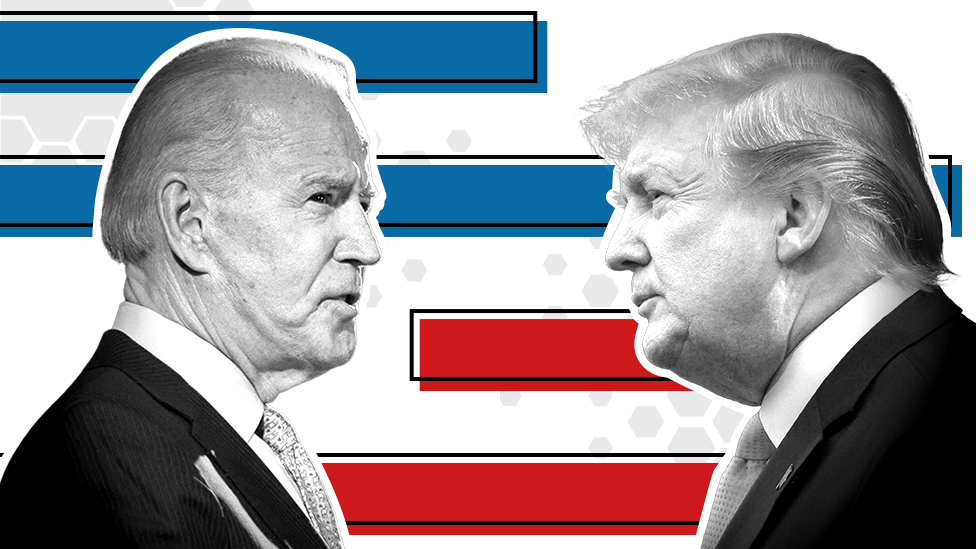
- Published28 October 2020
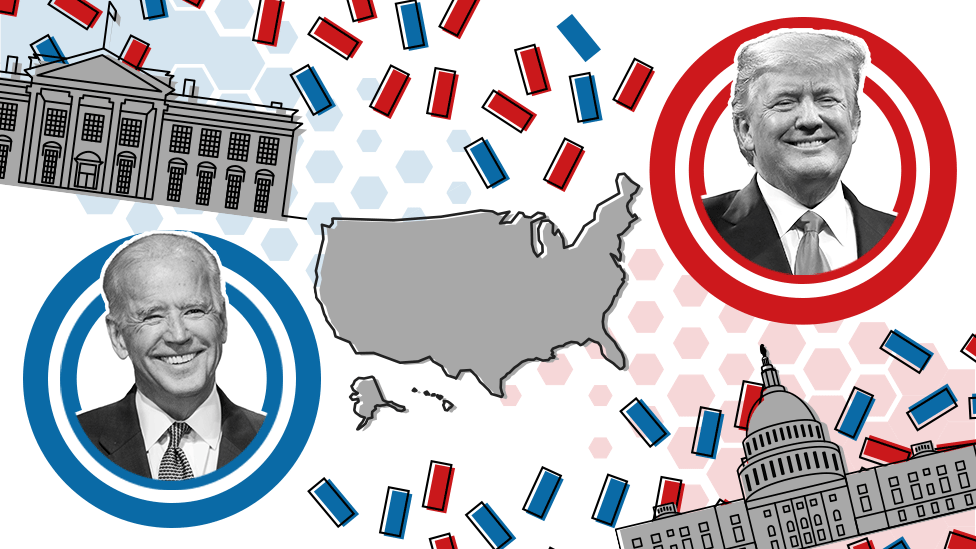
- Published15 October 2020
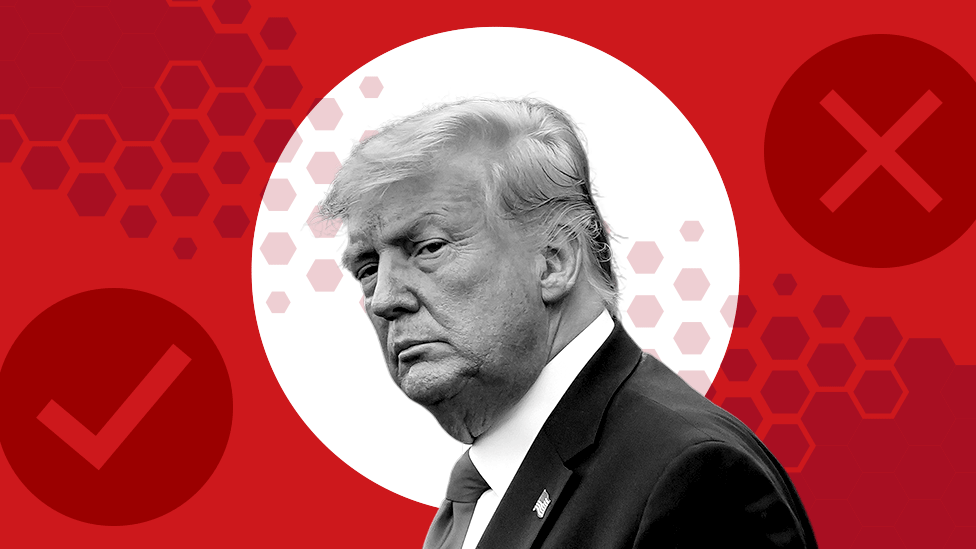
- Published18 October 2020
